actor
David Bowie
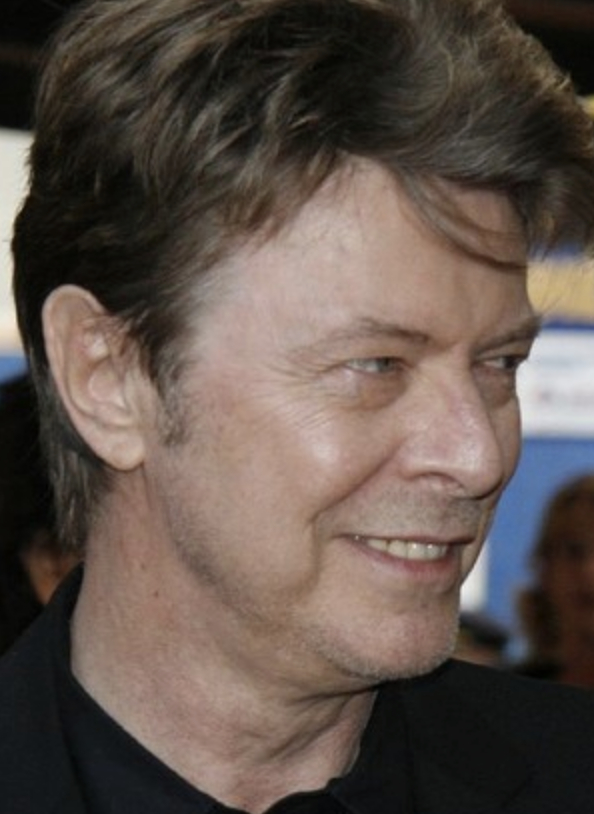
On this date in 1947, music legend David Bowie was born David Robert Jones in London to Margaret Mary, a waitress, and Haywood Stenton Jones, a promotions officer. He was raised without religion. Though he dabbled in different religions throughout his life, he later described himself as a nonbeliever.
His interest in music was piqued when his father brought home 45s of early American rock and roll artists, including Elvis Presley, Fats Domino and Little Richard. He was also influenced by an older brother, Terry, who tragically committed suicide when Bowie was 38. He joined his first band at 15 and hopped from band to band until he found success as a solo performer in 1969 with the release of his album “Space Oddity.”
His career was marked by experimentation with genre and persona, although he was most frequently considered a glam rock artist. He’s famous for his alter ego Ziggy Stardust, a character from Mars who was Bowie’s own creative invention. Throughout the 1970s and ’80s, he continued to release hit singles, including “Star Man,” “Young Americans,” and “Changes.” He collaborated with British rock group Queen on the song “Under Pressure” in 1981, which reached the top of the charts in the UK.
Bowie married Angela Barnett, a model and actress born in Cyprus, in 1970. They had a son, Duncan, before divorcing in 1980. He married the supermodel Iman in 1992. Their daughter Alexandra was born in 2000. Bowie didn’t perform live after 2006 but continued to record music. He died in New York City of liver cancer, two days after turning 69. (D. 2016)
PHOTO: Bowie at the Metropolitan Opera opening night in New York City in 2006; photo by NYCArthur under CC 2.0.
“I’m not quite an atheist and it worries me. There’s that little bit that holds on: Well, I’m almost an atheist. Give me a couple of months.”
— Bowie, interview with beliefnet.com (June 2003)
Alice Greczyn
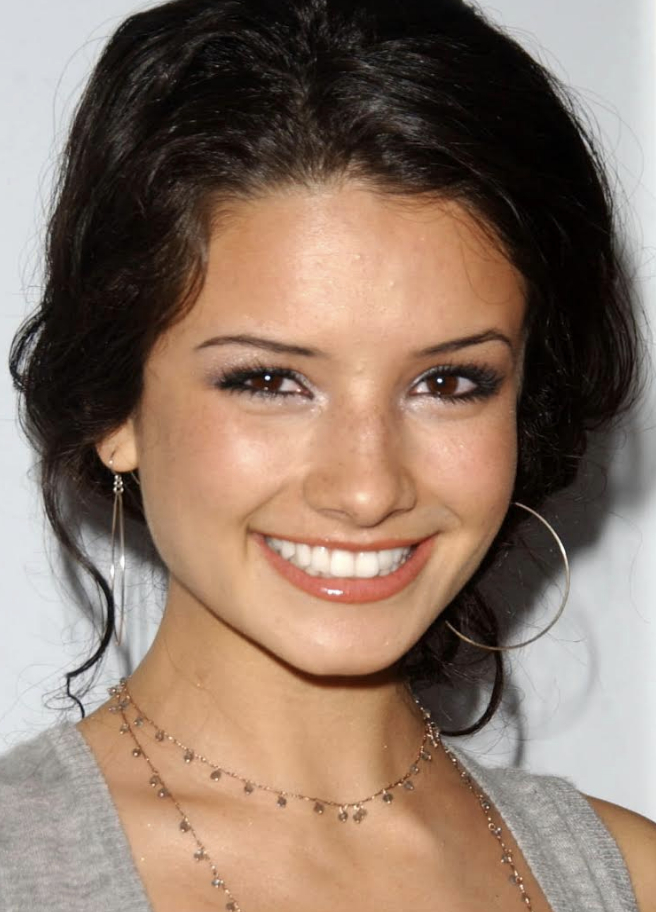
On this date in 1986, actress/writer Alice Hannah Meiqui Greczyn was born in Walnut Creek, Calif., to Jane and Ted Greczyn, the eldest of their five children. Her parents met at the University of California-Berkeley, where her dad was a campus police officer and her mother was a student. Both were very religious and raised the children as “Holy Roller-style” Pentecostals.
Church services were “very emotive, very falling to the floor, being ‘slain in the spirit,’ rolling around, shaking, praying in tongues, prophesying, massive outpours of laughter and crying,” Greczyn recalled. (The Graceful Atheist podcast, March 9, 2021)
Her parents had served as missionaries in Thailand and Nepal before her dad took the pastorship at a small Foursquare Gospel Church congregation in Rockford, Ill. Greczyn (pronounced Gretchen) and her siblings were home-schooled, not primarily for religious reasons but because their college-educated mother enjoyed teaching and the children’s company. The regimen was “well-rounded” compared to other home-schooling she was familiar with, Greczyn said.
The family moved around a lot and was living in Longmont, Colo., when Greczyn was attending a community college and modeling in the Denver area. Her modeling connections led to an offer to relocate to Los Angeles, so she abandoned plans to become a missionary nurse, and with her parents’ support a month shy of turning 17, moved from the church’s “purity culture” to L.A., “the American epicenter of hedonism.” (FFRF’s “Ask an Atheist,” Feb. 17, 2021)
How wide the gulf was became apparent when she was cast as Laura in a stage production of “The Glass Menagerie,” which required her to kiss an actor. She had never dated and the kiss made her feel dirty. “I felt sick to my stomach, just wretched.”
Greczyn started her onscreen career in the 2004 movies “Sleepover” and “Fat Albert,” followed by roles in “The Dukes of Hazzard” (2005), “Shrooms” (2007) and “Sex Drive” (2008). She was busy with episodic and recurring TV roles, including Sage Lund in “Lincoln Heights” (2007-09) and most famously as Madeline “Mads” Rybak in “The Lying Game” (2011-13, available online at CW Seed). She played Emma Randall on 11 episodes of “The Young and the Restless” in 2015.
From age 17 to about 21, she lived as a “progressive Christian” and called herself “a follower of Christ” but not a Christian. Escaping from a supposedly “God-led” marriage betrothal “was the beginning of my departure from Christianity,” she said, calling it one of “these little dominos adding up” that were tipping over and leading her away from religion. She had sex for the first time and felt “totally fine” afterward.
Recurring panic attacks from what she perceived to be religious trauma led her to seek help from a secular therapist, and she continued for three years. She read Leaving the Fold by Marlene Winell, who described her 1993 book as a tool for people recovering from religious indoctrination, particularly Christian fundamentalism. She started a website — daretodoubt.org — in 2019 as “a resource hub for people detaching from belief systems they come to find harmful.” That year she wrote, “I claim a disbelief in God. I do not know if he, she, they, or it is real. I do know that I don’t believe so.”
Her book Wayward: A Memoir of Spiritual Warfare and Sexual Purity was published in 2021. To Greczyn, it’s “a coming-of-age story [that] takes place within a Christian subculture that teaches children to be martyrs and women to be silent.” To what extent had she felt discounted? “I forgave myself for being female,” she wrote in Wayward.
“Unlike a lot of other memoir writers in my genre, my family and I are not estranged. I’m still very much in touch with them and very close to them.” … There’s so much love between my family and I, and despite how difficult it’s been at times, they’ve been very supportive.” (The Graceful Atheist podcast, March 9, 2021)
Watch her interview on FFRF’s TV talk show “Freethought Matters” on April 22, 2021.
PHOTO: Greczyn at the 9th Annual Young Hollywood Awards in 2007; photo by s_bukley / Shutterstock.com
“When I completely lost my faith, I was 21. That’s when I became an atheist. I gave God a test and she failed.”
— Greczyn, with tongue in cheek on FFRF's "Ask an Atheist: Dare To Doubt" (Feb. 17, 2021)
Chris Rock
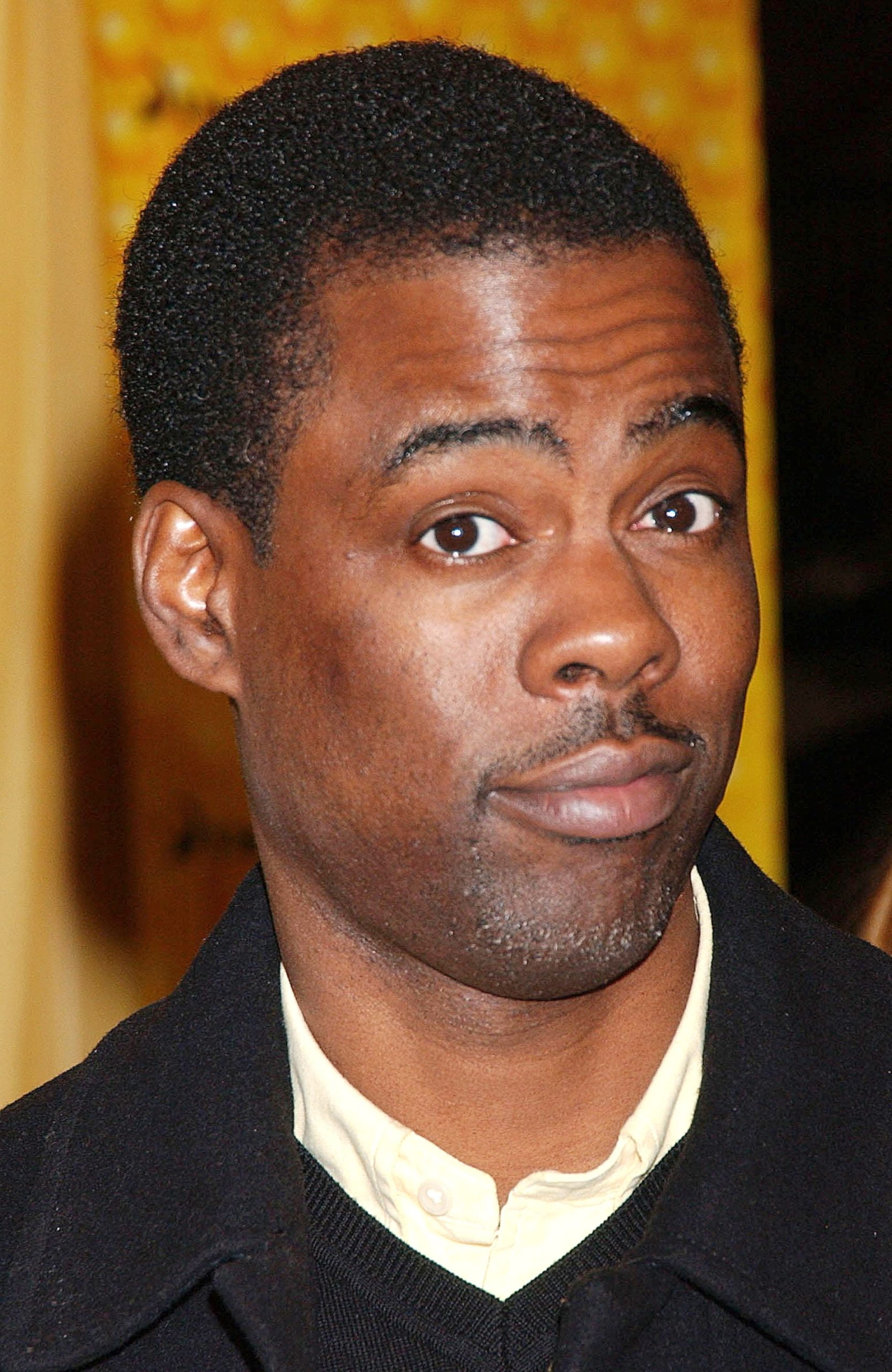
On this date in 1965, comedian, actor and producer Christopher Julius Rock III was born in Andrews, S.C. Shortly after Rock was born, his father, a truck driver and his mother, a teacher, moved to New York City. Rock was raised in the Bedford-Stuyvesant neighborhood of Brooklyn along with an older half-brother and three younger brothers. Rock’s parents, hoping it would improve his education, arranged to bus him to a different neighborhood, where he attended an almost entirely white public high school. He was subjected to racist bullying and harassment, and ended up dropping out, later earning a GED.
Comedic great Eddie Murphy discovered Rock performing stand-up in 1983 when Rock was just 18. In 1990 he joined the cast of “Saturday Night Live” and began appearing in bit roles in movies. He stayed with “SNL” for three years. Throughout the 1990s and 2000s, Rock’s stand-up was featured in five HBO specials. He hosted the 77th Academy Awards in 2005 and the 88th in 2016. He has won four Emmy Awards and three Grammy Awards. He was voted the fifth-greatest stand-up comedian in a poll conducted by Comedy Central.
Rock’s grandfather was a preacher and Rock says he was influenced by his performance style on the altar. However, that influence did not extend to religion. Rock’s comedy is peppered with skepticism about religion, including an episode of HBO’s “The Chris Rock Show” in which he visited with different faith leaders in a bit that mocked several major religions.
He directed and starred in the movie “Top Five” in 2014. His acting career also includes appearances in movies such as “Dogma” (1999), “Jay and Silent Bob Strike Back,” (2001), “Grown Ups,” (2010) and “Grown Ups 2” (2013). Netflix announced in 2016 that it would release two new stand-up specials, with Rock being paid $40 million per special. The first, “Chris Rock: Tamborine,” was released in February 2018 and was filmed at the Brooklyn Academy of Music. His second Netflix special was streamed from the Hippodrome Theatre in Baltimore in 2023.
He married Malaak Compton in 1996. They divorced in 2016 and have two daughters, Lola Simone (born 2002) and Zahra Savannah (born 2004).
“When you’re black there’s like no religion to turn to. It’s like, Christianity? I don’t think so. White people justified slavery and segregation through Christianity so a black Christian is like a black person with no f***king memory.”
— Outtake from the 1989 documentary short "Who Is Chris Rock?"
Cecily Strong
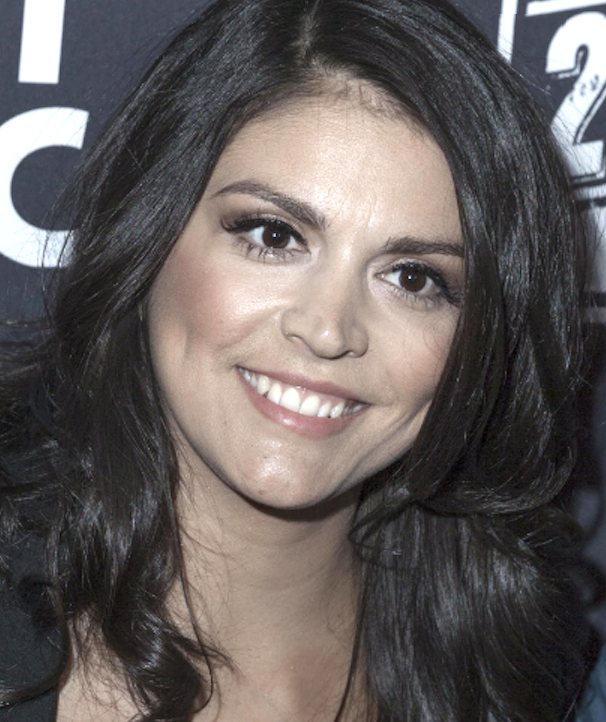
On this date in 1984, actress Cecily Legler Strong was born in Springfield, Ill., to Penelope (Legler) and William Strong, respectively a nurse practitioner and Associated Press bureau chief. She grew up in Oak Park, graduated from high school at the Chicago Academy for the Arts and earned a B.F.A. in theater from the California Institute for the Arts in Santa Clarita.
She worked at a Los Angeles deli and wine shop before returning to Chicago to study and perform with The Second City and iO Chicago improv troupes. Strong debuted as a featured player on “Saturday Night Live” on Sept. 15, 2012. The next season she became a repertory player and co-anchored the recurring Weekend Update segment with Seth Meyers. From 2015-18 she had film roles in “The Female Brain,” a remake of “Ghostbusters,” “The Boss,” “The Bronze” and “The Meddler.”
As of this writing, she is a co-producer and co-star of “Schmigadoon!” It debuted on Apple TV+ in 2021. She superseded Kate McKinnon by one episode on Dec. 17, 2022, as the longest tenured “SNL” female cast member.
Strong was in a relationship with comedy writer Mike O’Brien and later with a “mystery” Italian man she met in Spain but she has never married. She headlined the 2015 White House Correspondents Dinner at which she joked about bonding with President Obama: “I’d lace up a pair of Jordans, he’d slip on a pair of my mom’s jeans and we would just miss three-pointers until sundown, when, of course, we’d have to stop and pray to Mecca.”
In a 2014 interview with Glamour magazine, she advised playing with dogs as much as possible. “As a kid I had a German shepherd-collie mix named Emma who was the worst-behaved dog in the neighborhood. Her nickname was Emma Goddammit! I believe that dogs’ evolutionary purpose is to provide companionship. Animals offer the best unconditional love.”
“Dogs are the best: This is my religion.”
— Strong, writing in Glamour magazine (March 14, 2014)
Elizabeth Olsen

On this date in 1989, actress Elizabeth Chase Olsen was born in Sherman Oaks, Calif., to Jarnette (née Jones) and David Olsen, respectively a former ballet dancer and personal manager and a real estate developer and mortgage banker. Her twin sisters Mary-Kate and Ashley, older by two years, gained fame as child stars via the ABC series “Full House” (1987-1995).
Olsen started acting at age 4. Her parents divorced when she was 7. She appeared in her sisters’ 1994 TV film “How the West Was Fun.” Her debut film role was in “Martha Marcy May Marlene” (2011), earning several award nominations for playing a young woman suffering from delusions after fleeing a cult. She received a BAFTA Rising Star Award nomination and graduated from New York University’s Tisch School of the Arts in 2013.
Olsen next appeared in the horror film “Silent House,” the thriller “Red Lights” and the comedy “Liberal Arts.” She played Edie Parker, novelist Jack Kerouac’s first wife, in the biographical drama “Kill Your Darlings.” She played the leading role in “In Secret,” an adaptation of Émile Zola‘s 1867 novel “Thérèse Raquin.”
Olsen gained worldwide recognition as Wanda Maximoff/Scarlet Witch in the Marvel Cinematic Universe media franchise, appearing in the superhero films “Avengers: Age of Ultron” (2015), “Captain America: Civil War” (2016), “Avengers: Infinity War” (2018), “Avengers: Endgame” (2019) and the TV miniseries “WandaVision” (2021). Her performance in WandaVision garnered her a Primetime Emmy Award nomination. “Doctor Strange in the Multiverse of Madness,” also featuring Wanda Maximoff, was released in 2022 as the 28th film of the Marvel Cinematic Universe.
Olsen and actor Boyd Holbrook were in a relationship from 2011 to 2014. She dated musician Robbie Arnett of the band Milo Greene for three years and then revealed in 2021 that they had married.
PHOTO: Olsen at the 2012 Critics’ Choice Movie Awards in Hollywood, Calif.; photo by s_bukley/Shutterstock.com.
“When I was 13, I told my parents I didn’t believe in God anymore. I wanted to be an atheist because I believed that religion should be about community and having a place to go in prayer, not something that should determine women’s freedoms.”
— Interview, Dazed magazine (Sept. 2, 2013)
Daniel Craig
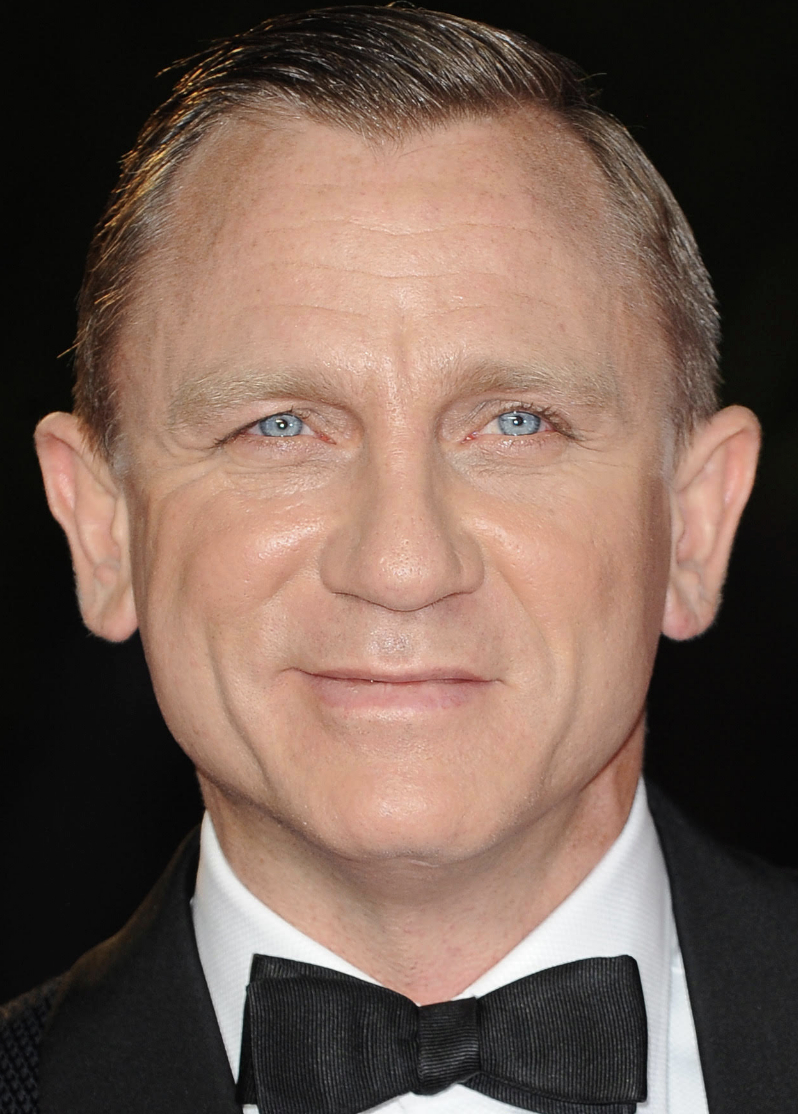
On this date in 1968, actor Daniel Wroughton Craig was born in Chester, England to Carol (née Williams) and Timothy Craig, respectively an art teacher and midshipman in the merchant marine. He began acting in school plays at age 6. At 16 he was accepted into the National Youth Theatre and then by the Guildhall School of Music and Drama, graduating in 1991.
Craig made his film debut in the drama “The Power of One” (1992) and appeared the next year in the Royal National Theatre’s production of “Angels in America” by playwright Tony Kushner. Throughout the 1990s, he played a variety of roles in screen and television productions. He co-starred with Angelina Jolie in the 2001 action film “Lara Croft: Tomb Raider” and achieved international fame in 2006 when he played James Bond, taking over from Pierce Brosnan, in “Casino Royale.”
It earned him a nomination for the BAFTA Award for Best Actor in a Leading Role. He followed with the sequels “Quantum of Solace” (2008), “Skyfall” (2012), “Spectre” (2015) and “No Time to Die,” which was scheduled for release in April 2020 but was postponed due to the COVID-19 pandemic. It was released in 2021. Craig’s role in the 2019 mystery film “Knives Out” earned him a Golden Globe nomination for Best Actor.
He married actress Fiona Loudon in 1992. They had a daughter, Ella, before divorcing in 1994. After long-term relationships with actress Heike Makatsch and film producer Satsuki Mitchell, he married actress Rachel Weisz in 2011. They announced the birth of a daughter in 2018.
Craig is notoriously private about his personal life and beliefs, although he has said he’s an atheist (see quote below). In 2019 in a Kaufmann Store interview, he said, “I don’t go to church. I’m not religious. But I think religion is fascinating because it affects our lives massively.”
When he hosted “SNL” on March 7, 2020, a sketch he appeared in with Kate McKinnon and Cecily Strong brought laughs from the audience. McKinnon: “Blace, I thought you left to become a priest.” Craig answered: “Yes, but I couldn’t do it — the no-sex part. Also, have you read the bible? It’s weird.”
PHOTO: Craig at the 2012 premiere of “Skyfall” at the Royal Albert Hall, Kensington, UK; photo via Shutterstock by Landmarkmedia.
DIE ZEIT: Are you a believer?
CRAIG: I’m an atheist.— Craig, quoted in the German weekly Die Zeit, "Real Heroes Are Shy" (Jan. 12, 2012)
John de Lancie
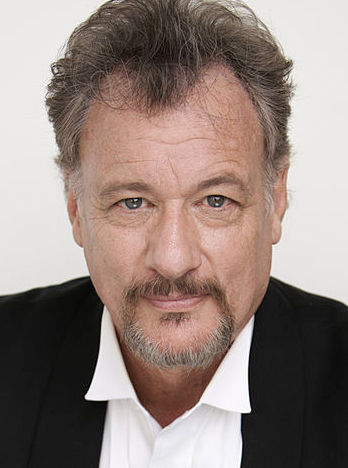
On this date in 1948, actor John Sherwood de Lancie Jr. was born in Philadelphia to Andrea and John S. de Lancie. His father was principal oboist for the Philadelphia Orchestra from 1954-77. “My parents, for all intents and purposes, were secular. And I just didn’t believe all this religious stuff. I never got any further than the Jonah and the whale story when I was about 6.” (Skeptical Inquirer, June 19, 2019)
He attended Kent State University and then won a scholarship to Juilliard in New York City. His acting career started in television in the mid-1970s. He played Eugene Bradford from 1982-89 on the soap opera “Days of Our Lives” and had numerous other small-screen roles. Perhaps his signature role was as the powerful, extra-dimensional being “Q” on “Star Trek” starting in the 1980s.
He married Marnie Mosiman in 1984. As of this writing, they live in Pasadena, Calif., and have two sons, Keegan and Owen.
De Lancie’s film career includes roles in “The Onion Field” (1979), “The Fisher King” (1991), “The Hand that Rocks the Cradle” (1992), “Multiplicity: (1996), “Saving Private Ryan” (voice, 1998), “Woman on Top” (2000) “Reign Over Me” (2007) and “Bronies” (2013).
He has performed as a narrator with some of the world’s leading symphony orchestras and wrote, directed and hosted “First Nights,” a series at the Walt Disney Concert Hall with the Los Angeles Philharmonic. He made his opera directorial debut in 2006 with the Atlanta Opera performing Puccini’s “Tosca.” With actor Leonard Nimoy, de Lancie started a company called Alien Voices to recreate radio broadcasts of classic science fiction stories such as “Journey to the Center of the Earth” and “The Time Machine.”
His many theater credits include playing Clarence Darrow in the 2007 national tour of “The Great Tennessee Monkey Trial” in which Ed Asner portrayed William Jennings Bryan. In 2017 he helped unveil the Darrow statue commissioned by FFRF to stand at the Rhea County Courthouse in Dayton, Tenn. De Lancie said the statue “is not about trying to convince somebody who believes in God, a god, multiple gods, that that doesn’t exist. Where I’m interested is to say, as Darrow said, the Bible is not a science book, it’s not a biology book, it’s not the place you would go to make a locomotive or steamboat.” (Chattanooga Times Free Press, July 15, 2017)
A longtime rationalist, he says he’s “openly secular” and started his 2016 Reason Rally speech in Washington, D.C., with this: “My name is John de Lancie, and I am a god. At least, I’ve played one on TV. And I’m here to tell you as a god that I was created by humans. And the words I spoke were written by men and women.”
In 2018 in San Francisco, he accepted FFRF’s inaugural Clarence Darrow Award with a speech that included: “Three years ago, if the Christian fundamentalists of America had been told they would be voting en masse for a pathological liar, a serial philanderer, a man whose very name when placed in the same sentence with the phrase Christian values elicits laughter, they would have been insulted. As arbiters of all things moral and ethical, they would have been shocked. But that was then and this is now.”
In a speech delivered in May 2020 during the Secular Student Alliance’s online graduation event, de Lancie said: “I believe that truth is more powerful than fiction. That ideology, dogma and groupthink are dangerous and should always be challenged. … ‘Being’ secular is not a lapel pin — it’s a mission.”
His other projects include an animated series titled “God’s Goofs” on the absurdity of so-called intelligent design to deflate the notion that humankind is the product of a creator and a stage play based on the 2005 intelligent design trial in Dover, Pa.
“My biggest concern is that with certain religious training you seem to lose any sort of critical thinking in the process. You seem to lose your ability to ask questions.”
— De Lancie interview, Skeptical Inquirer (June 19, 2019)
Cate Blanchett
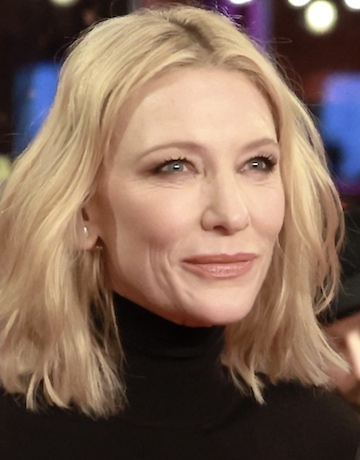
On this date in 1969, actress Catherine Élise Blanchett was born in Ivanhoe, Australia, a Melbourne suburb, to June (née Gamble) and Robert Blanchett Jr. Her Australian mother met her father, a Texas native who was a U.S. Navy chief petty officer, when his ship broke down. He had a fatal heart attack when Blanchett was 10, leaving her mother to raise three children.
She sought solace in religion but found none after her father died. “I wanted the strong hand of God to put a hand on my childish shoulders to say ‘your father is with me. He’s having fun. You’ll see him in 60 years.’ But that didn’t happen. And so as a ten-year-old I fled from the church and moved down to the river and spent my childhood propelled into nature. … If I’d stayed inside the Methodist church I’d have a lot of bad guitar playing, but instead I rode my bike, thinking I was Nancy Drew, down by the Yarra River.” (The Sunday Times, March 10, 2024)
She had an early interest in theater and the performing arts and earned a bachelor of fine arts in 1992 from the National Institute of Dramatic Art in Sydney. Her first stage roles were opposite Geoffrey Rush in the David Mamet play “Oleanna” and as Clytemnestra in a production of Sophocles’ “Electra.” She branched out into television work and feature films.
Blanchett made her movie debut in 1997 in a supporting role as a nurse captured by the Japanese during World War II. “Paradise Road” co-starred Glenn Close and Frances McDormand. She rose to international prominence in “Elizabeth” (1998), playing a young Elizabeth I of England. It won her a Golden Globe, a British Academy Award and Screen Actors Guild and Academy Award nominations for Best Actress.
She won further acclaim for her roles in “The Talented Mr. Ripley” and as the elf leader Galadriel in Peter Jackson’s blockbuster Lord of the Rings trilogy. Her first Oscar, for Best Supporting Actress in 2005, was for her portrayal of Katharine Hepburn in Martin Scorsese’s “The Aviator.”
The scope and number of her performances and awards is daunting. As of this writing, Blanchett has appeared in over 70 films and 20 theater. As of 2019, her highest-grossing films were The Hobbit and Lord of the Rings trilogies, “The Curious Case of Benjamin Button” (2008), “Indiana Jones and the Kingdom of the Crystal Skull” (2008), “Cinderella” (2015), “Thor: Ragnarok” (2017) and “Ocean’s 8” (2018).
She produced the nine-part FX/Hulu historical drama miniseries “Mrs. America” in 2020, starring as conservative activist Phyllis Schlafly and starred with Bradley Cooper in Guillermo del Toro’s “Nightmare Alley,” nominated for a Best Picture Oscar in 2021. She also appeared that year with Jennifer Lawrence and Leonardo DiCaprio in the black comedy “Don’t Look Up,” also nominated for Best Picture. With those two nominations, Blanchett broke the record held by Olivia de Havilland of being the actress with the most credited roles in Best Picture nominees.
She married Australian playwright and screenwriter Andrew Upton in 1997. They have three sons — Roman, Dashiell and Ignatius — and a daughter Edith, whom they adopted in 2015 seven years after Ignatius was born.
Blanchett has sometimes talked about her agnosticism. She was attracted to Catholicism after her father died but it didn’t last long. “For an entire year my best friend was Catholic and I went every week to church, wanting a sign, and I knew nothing about the dark corridors of the Catholic Church at that time in my life. … I’m a little bit terrified by people who are so completely certain.” (BANG Showbiz, May 2023)
“I’m often bewildered by the degree to which most Western religions preach ‘definitive’— a definitive way of looking at the world and what may lie beyond. I think faith, true faith, is riddled with doubt.” (inews UK, March 15, 2024)
In “The New Boy” (2023), she played Sister Eileen, a nun running an orphanage for Indigenous boys. “I hazard to guess what anyone who was a nun in rural Australia with a stolen generation of Indigenous kids has seen or participated in. There’s a lot of murky water under that bridge for all parties. I think Sister Eileen definitely has seen some things she didn’t want to see and is atoning perhaps for the sins of those who have passed on in the monastery.” (Hollywood Reporter, May 16, 2023)
PHOTO: Blanchett at the 2023 Berlin International Film Festival; photo by Elena Ternovaja under CC 3.0.
“I’m a big believer that two opposites can co-exist and that, in fact, you can’t have faith without doubt.”
— Interview, Sydney Morning Herald (June 27, 2023)
Stanley Baxter
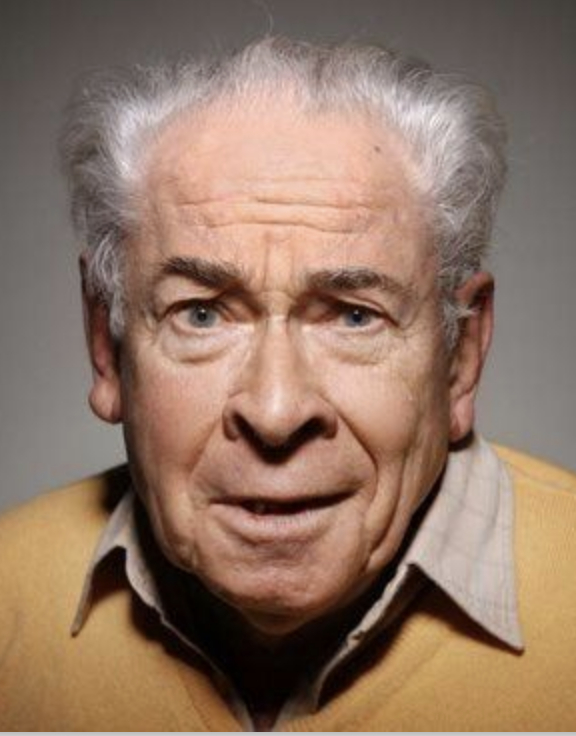
On this date in 1926, Scottish actor/author/atheist Stanley Livingstone Baxter was born in Glasgow. His father, Frederick, was an actuary and assistant bank manager, and his mother, Bessie, nurtured his early penchant for performing by having him entertain at their home and in public venues such as church halls.
He served in a National Service theater unit in the Far East, where he entertained troops. He worked in roles as a child actor for BBC Scotland and continued in theatrical productions before moving to London in the 1950s to pursue a career in radio and television. “The Stanley Baxter Show” ran from 1963 to 1971 and catapulted him to stardom.
Through the ensuing decades, he starred in and produced regular specials and series and became a successful author. In 2007, critic Laurence Marcus called him “Scotland’s mimic supreme, who combined superbly observed, written and performed comedy in spectacular eye-catching style. He is one of the true creative geniuses in British television light entertainment, and as far as comedy goes, Stanley Baxter is the true King of Scotland.”
He married Moira Robertson in 1951. In The Real Stanley Baxter, a 2020 authorized biography, Baxter came out as gay and described how he told Moira he was gay before they married. “I told her my preference and said, ‘That’s why I am breaking off the relationship. This would be no life for you, married to someone who is essentially and primarily a homosexual.’ ” She supposedly threatened suicide if he ended the relationship, so they were married. Their arrangement allowed him to bring men home. They stayed married until her death in 1997.
Baxter was among about 200 public figures who signed a letter in 2014 to The Guardian opposing Scottish independence. In a 2005 interview (Scotsman, May 26, 2005), he answered a jocular question about “the good Lord” looking after him in his old age with, “Oh, I’m not so sure about that. I’m a lifelong atheist. Not a believer. So there couldn’t ever be a part for me in the great theatre in the sky.”
“Like Noel Coward and a lot of others in the profession, I’ve never believed in a life hereafter. We don’t remember anything before we were born, why should we consider anything after death? That may be thought blasphemous by some people, I dare say. Just supposing I met what some people call our ‘maker’ and we had a confrontation? I’d say: ‘Sir, you didn’t give us enough information.’ ”
— The Scotsman, May 26, 2005
Johnny Depp
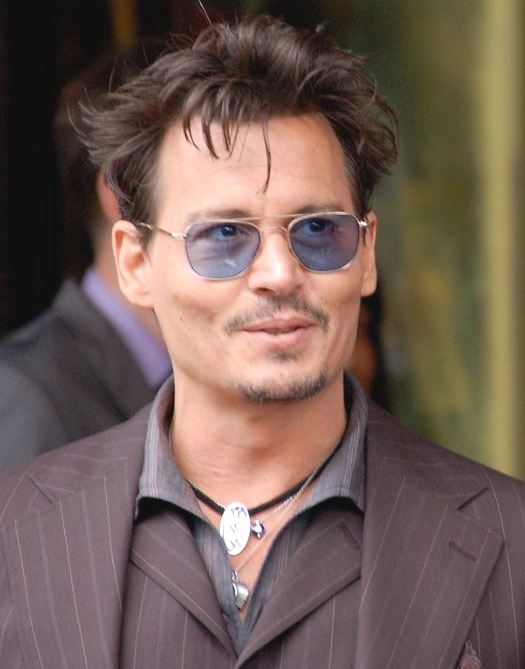
On this date in 1963, actor John Christopher Depp II was born in Owensboro, Ky., the youngest of four children of Betty Sue (Wells) Palmer and John Christopher Depp. His father, a civil engineer, left the family when Johnny was 15. He then dropped out of school. In a 1996 Playboy interview, Depp said he counted his mother’s waitress tips when she got home. He has “Betty Sue” tattooed on a heart on his left arm.
In the interview, he talked about his bible-thumping uncle: “That gave me an odd sense of religion. He was theatrical in the pulpit. He would start crying, praising the Lord. Pretty soon the adults were screaming hallelujah, getting on their hands and knees, crawling up to kiss his shoes, and I just didn’t buy it. I’m not saying my uncle was full of shit, because he was a good guy. I just didn’t like the duality — seeing him behave normally at home and a whole different way in the pulpit. It was too convenient.”
Depp fronted several rock bands, singing and playing guitar, keyboard and drums. On a trip to Los Angeles after he married his first wife, Lori Allison, and was working as a ballpoint pen salesman, he met Nicolas Cage, who convinced him to try acting. That led to Depp’s film debut in 1984’s “Nightmare on Elm Street.” A role in the TV series “21 Jump Street” made him a teen idol and led to Hollywood opening its doors to him further.
Collaborating for the first time with director Tim Burton in 1990’s “Edward Scissorhands,” he started carving a niche “as a serious, somewhat dark, idiosyncratic performer, consistently selecting roles that surprised critics and audiences alike,” according to the Internet Movie Database. As of this writing, Depp has 77 credited roles in films and TV. With his dark good looks, Depp is a perennial favorite on “sexiest” lists. He’s also on “wealthiest actor” lists, topping it in 2012 with an estimated $75 million in earnings.
Films featuring Depp have grossed over $3.1 billion in the U.S. and over $7.6 billion worldwide. He has three Oscar nominations and numerous Golden Globe nominations, winning the latter for Best Actor for demon barber “Sweeney Todd” in 2008. It was announced in early 2016 that Depp and his actress wife Amber Heard (he’s 23 years older) would both speak at the Reason Rally at the Lincoln Memorial in June. He and Heard divorced in 2017. Depp has two children with French singer/actress Vanessa Paradis: Lily-Rose Melody, born in 1999, and John Christopher III “Jack,” born in 2002.
After a six-week trial in 2022 on claims and counterclaims of defamation, a jury found Heard libeled Depp in a 2018 op-ed alleging domestic abuse. Depp was awarded $10.35 million in damages. The jury also found one of Depp’s lawyers defamed Heard and awarded her $2 million. The final resolution, in December 2022, awarded $1 million to Depp, who said he would donate it to charity.
PHOTO: By Angela George under CC 3.0.
LARRY KING: “Do you have faith?”
DEPP: “Yes. I have faith in my kids. And I have — I have faith, you know, that as long as you keep moving forward, just keep walking forward, things will be all right, I suppose, you know. Faith in terms of religion, I don’t. Religion is not my specialty, you know.”— Interview, "Larry King Live" (Oct. 16, 2011)
Michael J. Fox
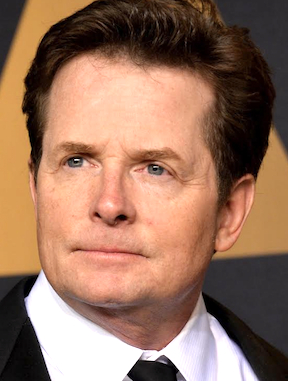
On this date in 1961, actor Michael Andrew Fox, known professionally as Michael J. Fox, was born in in Edmonton, Alberta, to Phyllis (née Piper), an actress and payroll clerk, and William Fox, a police officer and Canadian Forces member. After starring in the Canadian TV sitcom “Leo and Me” at age 15, he moved to Los Angeles.
Playing Alex P. Keaton on NBC’s popular “Family Ties” (1982-89) earned him three Emmy Awards and a Golden Globe. Producer Brandon Tartikoff opposed casting Fox because, according to Fox’s 2002 memoir Lucky Man, “How could someone that short (5’4″) have Michael Gross and Meredith Baxter Birney as his parents?”
He married “Family Tiies” co-star Tracy Pollan in 1988. They have four children: son Sam (b. 1989), twin daughters Aquinnah and Schuyler (b. 1995) and daughter Esmé (b. 2001). Pollan is Jewish and the children were raised in Reform Judaism.
Fox’s later roles, including on the ABC sitcom “Spin City” (1996–2000), brought him two more Emmys, three more Golden Globes and two Screen Actors Guild Awards. He had earlier adopted the middle initial J as a tribute to character actor Michael J. Pollard (C.W. Moss in “Bonnie and Clyde”). He starred in the feature film “Back to the Future,” which became a trilogy.
Numerous other movie roles include “Doc Hollywood,” “Bright Lights, Big City,” “For Love or Money,” “The American President” and “Mars Attacks!” His last major film role was in “The Frighteners” (1996). He was diagnosed with Parkinson’s disease in 1991 at age 29 and disclosed his condition to the public in 1998.
Since 1999, Fox has worked mainly as a voice-over actor. He founded the Michael J. Fox Foundation for Parkinson’s Research in 2000. It has raised over $1 billion for research. He has written three books besides Lucky Man: Always Looking Up: The Adventures of an Incurable Optimist (2009), A Funny Thing Happened on the Way to the Future: Twists and Turns and Lessons Learned (2010) and No Time Like the Future: An Optimist Considers Mortality (2020).
In No Time Like the Future,” Fox wrote that he is not a “subscriber to any particular orthodoxy,” called optimism “my faith” and said “I’m beginning to see that faith, or fear’s opposite, can be expressed as gratitude, which has always been the bedrock of my optimism.”
“Parkinson’s and alcohol took a sledgehammer to any illusions I may have had that I was in control. I came to accept that any disease or condition beyond my control is, in effect, a power greater than myself,” Fox wrote in Always Looking Up.
“To survive this destructive energy, I must look to an even higher power. For my purposes, I need neither define it nor have others define it for me, only accept its existence. It is evident in Tracy’s love and inexhaustible friendship, the toothless gap in Esme’s smile, Aquinnah’s grace, Schuyler’s grit, Sam’s intrepid curiosity. So much to savor, so much to be grateful for.”
PHOTO: Fox in 2017 at the 89th Annual Academy Awards in Los Angeles; Featureflash Photo Agency / Shutterstock.
TERRY GROSS: You know, you say that the last thing to go is the future, but some people believe that there is a future after death, that there’s an afterlife. Do you and did you ever believe that?
FOX: If I get to the bottom of the Cracker Jack box, then there’s a prize, I’m happy. But if there isn’t, I just enjoy the Cracker Jack. My happiness here doesn’t depend on something that it’s awaiting me after it. I don’t have a complex orthodoxy. I have a vague spiritualism that tells me if I live a good life, good things will happen. But I don’t have any expected reward or expected afterlife or anything like that. I just want to make the most of this life and make as positive of an impact I can on people around me and be grateful for their love and attention and try to do something, you know, worthwhile and not counting on getting a do-over.
— NPR "Fresh Air" (Dec. 21, 2020)
Pauline McLynn
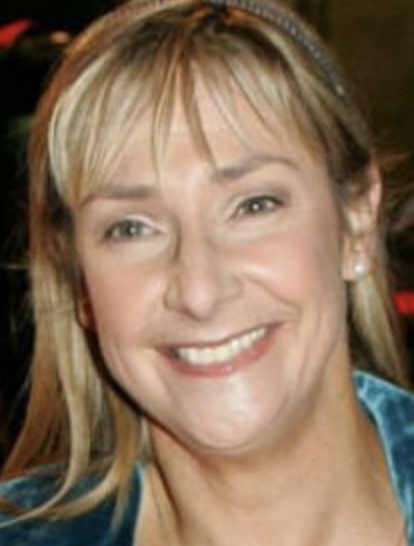
On this date in 1962, actress and author Pauline McLynn was born in Sligo, Ireland, to Padraig and Sheila McLynn. Six months later they moved to Galway, where she grew up and was educated by the Sisters of Mercy (one of the orders operating the infamous Magdalene Laundries) before enrolling at Trinity College-Dublin to study modern English and the history of art.
McLynn pursued an acting career after graduating and performed with all of the major Irish theater companies. She got her television start on RTÉ, Ireland’s public broadcaster, in the sitcom “Nothing to It?” She’s perhaps best-known for playing the housekeeper Mrs. Doyle on the British comedy “Father Ted,” which aired from 1995-98 and followed the misadventures of three Irish Catholic priests. She was featured in 24 episodes of the series “Shameless,” on which the American Showtime series starring William H. Macy is based.
McLynn won the British Comedy Award for “Top TV Comedy Actress” in 1996 for “Father Ted” and the 2007 Irish Film and Television Award for “Best Actress in a Lead Role in a Feature Film” for the movie “Gypo.” She’s had numerous other TV series and movie roles, including Aunt Aggie in the 1999 film “Angela’s Ashes.” Most recently as of this writing, she played Bunni in 52 episodes of “Drop Dead Weird” on the Australian Seven Network.
Married to theatrical agent Richard Cook since 1997, she has written 10 novels, the first three featuring private detective Leo Street, several short stories and a chapter of Yeats Is Dead, the serial novel by 15 Irish writers, including Frank McCourt.
In the three-part BBC miniseries “Pilgrimage: The Road to Istanbul” (2020), seven celebrities travel from Serbia to Turkey to promote tolerance for all beliefs and cultures. “I was christened a Catholic but I’m a secular person,” McLynn explained on the show, rejecting the notion that religious people have a monopoly on kindness and decency just because of their belief in God. “All of the talking about ‘Well, I like to be kind and everything,’ yeah, I do as well, but I just think that’s being a decent human being.”
“I was brought up an Irish Catholic at a time when the church and the state were so entwined in Ireland that you just didn’t get a choice. It was more a habit than a religion to the point where I realized I wasn’t practicing or anything anymore, it just meant so little that I didn’t even miss it. I’m an atheist.”
— McLynn, quoted in the Irish Mirror (March 22, 2020)
John Leguizamo
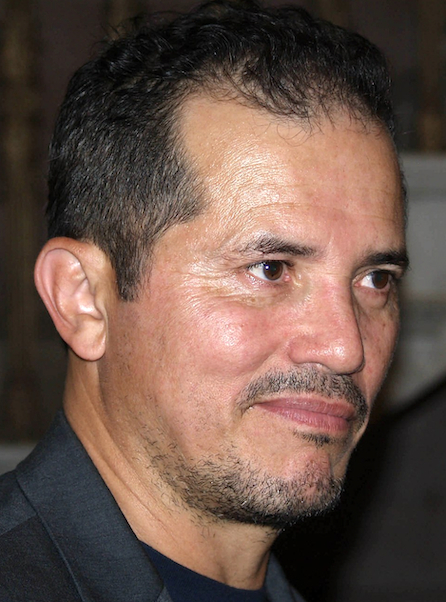
On this date in 1964, actor John Alberto Leguizamo was born in Bogotá, Colombia, to Alberto and Luz Leguizamo. The family emigrated to New York City when he was 4. In high school he was voted “most talkative” by classmates. He left NYU’s Tisch School of the Arts to pursue stand-up comedy and made his TV debut in 1986 on “Miami Vice.”
Other early roles were as a friend of Madonna’s boyfriend in her “Borderline” video (1984), a terrorist in “Die Hard 2” (1990), a robber in “Regarding Henry” (1991) and as Luigi Mario in the 1993 adventure comedy “Super Mario Bros.” That same year he had a prominent role in Brian De Palma’s “Carlito’s Way,” which boosted his career in serious roles.
Leguizamo had other numerous roles in the 1990s, including a star turn as a drag queen in “To Wong Foo, Thanks for Everything! Julie Newmar” (1995), for which he received a Golden Globe Nomination for Best Supporting Actor. To promote the Baz Luhrmann movie “Moulin Rouge!” (2001), he appeared on a celebrity edition of the U.S. version of “Who Wants to Be a Millionaire?” with Kelly Ripa, Martin Short and Chevy Chase. In 2008, he co-starred in “The Happening,” written and directed by M. Night Shyamalan.
He hit the stage with his Obie-winning “John Leguizamo: Mambo Mouth” (1991), in which he portrayed seven different Latino characters. He made his Broadway debut in “John Leguizamo: Freak” (1998), a one-man show filmed for HBO by Spike Lee. In 2011 he opened his semi-autobiographical, one-man show “Ghetto Klown” on Broadway. His memoir Pimps, Hos, Playa Hatas and All the Rest of My Hollywood Friends: My Life, was published in 2006.
He hosted the 2018 Obie Awards and directed and starred in “Critical Thinking” (2020), based on a 1998 true story about five LatinX and Black teens from the Miami ghetto who make it to the National Chess Championship. He co-founded NGL Collective, a digital media company based in New York that helps clients reach the Hispanic market. “Last year, Latinx people were 3 percent of the faces in front of the camera and behind the camera,” he told Hispanic Executive. (9-11-20)
Leguizamo married actress Yelba Osorio in 1994. They divorced in 1996. He married Justine Maurer, a costumer working on “Carlito’s Way,” in 2003. They have a daughter, Allegra Sky (b. 1999), and a son, Ryder Lee (b. 2000). They were the flower girl and ring bearer at their parents’ wedding.
On “Real Time With Bill Maher” (Oct. 16, 2020), Leguizamo described himself as “godless.” Asked by The Onion A.V. Club if there’s a God, he said, “Yeah, but there’s not just one God. There’s a whole lot of gods, because one God couldn’t have possibly made so many mistakes all by Himself. This had to be done by committee.” (Oct. 9, 2002)
“I’m a recovering Catholic.”
— Leguizamo tweet, responding to one that asked if he's Catholic like most Latinos. (Twitter, Jan. 31, 2018)
Rose Byrne

On this date in 1979, Australian actress Mary Rose Byrne was born in Sydney to June and Robin Byrne, respectively an atheist school administrator and agnostic statistician/market researcher. She started taking acting lessons at age 8 and landed her first role in the movie “Dallas Doll” when she was 15.
She studied drama at Sydney’s Australian Theatre for Young People and later at the Atlantic Theater Company in New York, whose founders included David Mamet and William H. Macy. She appeared in a variety of Australian television and movie roles before her first “big budget” performance in George Lucas’ “Star Wars: Episode II – Attack of the Clones” (2002).
Bryne followed that by playing a temple priestess in “Troy” (2004), in which Brad Pitt starred as the mythic Greek warrior Achilles, and an aristocrat in Sofia Coppola’s “Marie Antoinette” (2006). She was nominated for Golden Globe and Primetime Emmy awards for playing an attorney in all 59 episodes of the FX and DirecTV legal thriller “Damages” alongside Glenn Close (2007-12).
She stayed busy throughout the 2010s in numerous small- and large-screen roles. She played Gloria Steinem opposite Cate Blanchett as conservative activist Phyllis Schlafly in “Mrs. America,” the 2020 FX on Hulu series about the fight to pass the Equal Rights Amendment in the 1970s and ’80s. She was cast in 2019 opposite Steve Carrell in Jon Stewart’s political satire “Irresistible,” released in 2020 in which she played a Republican consultant for a mayoral race in a small, right-wing Wisconsin town.
She told People magazine (May 1, 2020) that she was sheltering from the coronavirus pandemic in New York City with actor Bobby Cannavale, whom she’s been with since 2012 and has two sons, Rocco (b. 2016) and Rafa (b. 2017). They call themselves husband and wife even though they’ve never married. Before that Byrne was in a relationship with actor Brendan Cowell from 2003-10.
Byrne told BlackBook magazine in 2009 she was agnostic and that life is “a series of chemical accidents. That’s the type of way I choose to believe. Maybe because I’m not religious.”
PHOTO: Byrne at the Australian premiere of “I Give It a Year” in 2013; Eva Rinaldi photo under CC 2.0.
“I think the fact that there are so many different religions in the world immediately makes me suspicious. How can you know which one is right?”
— Interview, BlackBook magazine (March 18, 2009)
Mara Wilson
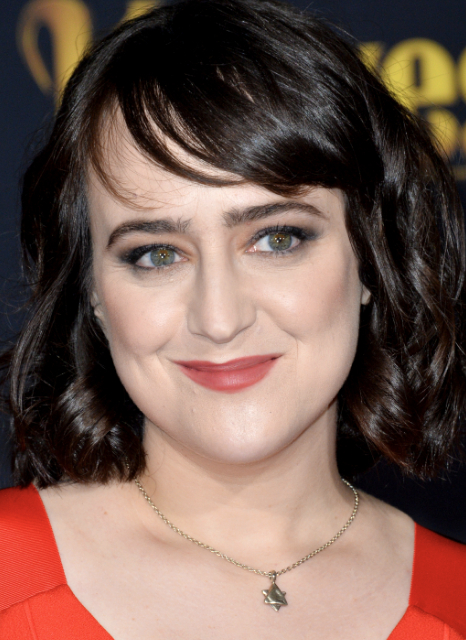
On this date in 1987, actress and writer Mara Elizabeth Wilson was born in Burbank, Calif., to Suzie (Shapiro) and Michael Wilson and was raised Jewish in her early childhood. She played Natalie Hillard, the daughter of Robin Williams and Sally Field in “Mrs. Doubtfire” when she was 5 and had a role in the remake of “Miracle on 34th Street” in 1994.
She had the title role in 1996 in director Danny DeVito’s “Matilda,” an adaptation of Roald Dahl’s young-adult book. Her mother died of breast cancer during filming of the highly acclaimed movie when Wilson was 9. She received the National Association of Theatre Owners’ Young Star of the Year award in 1995. She retired from acting after her role in “Thomas and the Magic Railroad” (2000). “I like to think of it as a mutual break-up: Hollywood didn’t really want me anymore, and I was over it, too,” she later wrote on her website Mara Wilson Writes Stuff.
She returned to acting in 2012 but not in any serious way, with relatively few appearances. She writes extensively, and her work has appeared on Elle.com, McSweeney’s, The New York Times, Vanity Fair, the Daily Beast, Jezebel and other outlets. Her play “Sheeple” premiered at the New York International Fringe Festival in 2013, and she is the author of the 2016 autobiography Where Am I Now? True Stories of Girlhood and Accidental Fame.
Wilson has been open about her struggles with mental illness since her OCD diagnosis at age 12 and about her lack of religious belief. On the live show and podcast “RISK!” (Dec. 14, 2015), she talked about her Catholic stepmother’s efforts to get her and her younger sister Anna to convert: “[Anna] became Catholic, and I became an atheist.”
“Mara came out publicly as bi — although she now tends to prefer the label queer (‘I like queer more than I like bisexual, but I have no problem with people calling me bisexual,’ she says) — on Twitter in the wake of June 2016’s tragedy at the Pulse Nightclub in Orlando.” (“Matilda Is Bi and So Am I,” Sept. 20, 2017) She was the American Humanist Association’s 2019 LGBTQ Humanist Award recipient.
Wilson read the His Dark Materials trilogy by Philip Pullman when she was 15: “It’s a retelling of ‘Paradise Lost’ with the premise that the God that we know is not actually God. I was OCD and I worried a lot about what God thought. These books put forward a pretty good case that maybe there was no God. I remember breaking down and crying when I read it because it altered the way I saw the world.” (TheaterMania interview, Aug. 7, 2013)
In 2018 she was offered a script about a Christian redemption movie that suggested famous child actors for roles in the movie. On Twitter she said she rejected the movie’s premise, which implied that child actors somehow need to be redeemed. “It’s as if they want us to be part of a very specific redemption narrative. Being a child star, falling from grace and public view, then finding Jesus and making liberal Hollywood safe for right-wing Christians.” (@MaraWilson tweet, May 25, 2018)
She wrote in a follow-up tweet: “The idea that our lives might be more than a cautionary tale, or some cheap inspiration, is beyond their comprehension.” In a 2017 NPR interview, “The Simpsons” voice actor Nancy Cartwright said the young Wilson inspired a character’s voice in the episode “Bart Sells His Soul.”
PHOTO: Wilson in Los Angeles at the premiere of the movie “Knives Out” in 2019; photo via Shutterstock by Featureflash Photo Agency
“Eventually, I saw Julia Sweeney‘s monologue ‘Letting Go of God.’ That changed everything. I walked out of the theater and said, ‘You know what, I don’t believe there is a God, and I’m OK with that.’ ”
— Wilson, TheaterMania interview (Aug. 7, 2013)
John Landis
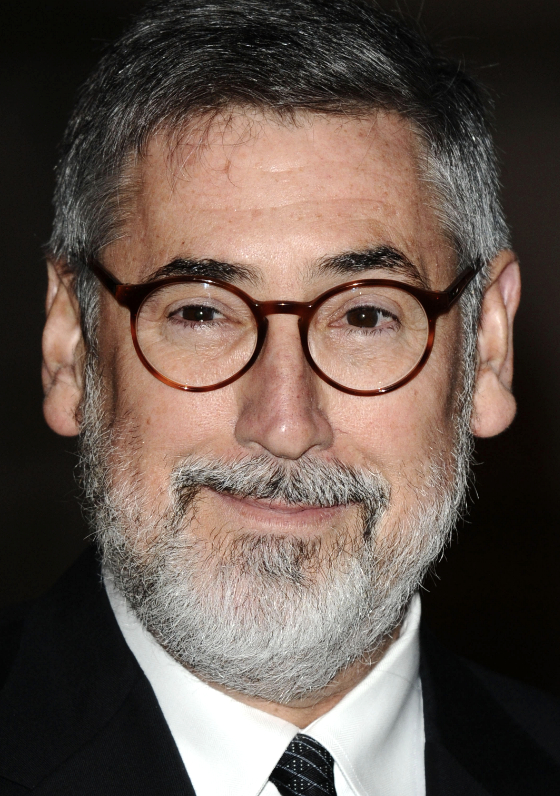
On this date in 1950, American director, producer, screenwriter and actor John Landis was born in Chicago. Landis, who was born into a Jewish family, began his career working as a mailboy for 20th Century Fox. When Landis was only 21 he made his directorial debut with “Schlock” (1971), but it was 1978’s “National Lampoon’s Animal House” that brought him commercial success, grossing over $120 million domestically. Landis co-wrote and directed “The Blues Brothers” (1980), starring John Belushi and Dan Aykroyd. “An American Werewolf in London” (1981) won the Academy Award for Best Makeup.
In 1982 Landis was charged with involuntary manslaughter for the death of actor Vic Morrow and two child extras during the filming of “Twilight Zone.” Morrow and the extras, Myca Dinh Le, 7, and Renee Shin-Yi Chen, 6, were trapped beneath a helicopter when it crashed due to special-effect explosions that went off too close to the tail rotor. Landis was riding in the copter when it crashed and suffered injuries. He was eventually acquitted of the charges and the families settled out of court with the film studio.
Landis would go on to direct many more blockbuster films, including “Trading Places” (1983), ”Three Amigos” (1986), ”Coming to America” (1988), “Beverly Hills Cop III” (1994) and “Blues Brothers 2000” (1998, co-writer with Dan Aykroyd). Landis directed the music videos for Michael Jackson’s “Thriller” (1983) and “Black or White” (1991).
Landis has spoken about his atheism on multiple occasions. He and his wife Deborah Nadoolman, an Oscar-nominated costume designer, have two children, Max and Rachel.
“I’m an atheist. I do not believe in the devil; in fact, I’m suspect of people who do.”
— Landis, Independent Film Channel interview (Nov. 23, 2011)
Charlize Theron
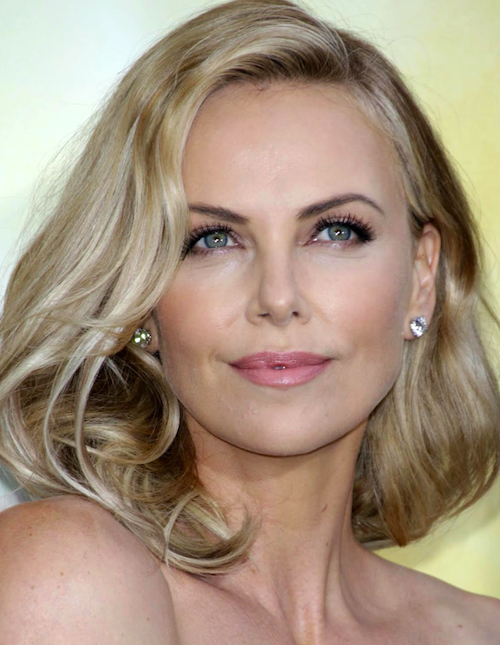
On this date in 1975, actress Charlize Theron was born in Benoni in the Transvaal region of South Africa, the only child of Gerda (Maritz) and Charles Theron, who operated the nation’s third-largest road construction business and owned a large farm. Her native tongue was Afrikaans but she also became fluent in English. Her childhood goal was to become a ballet dancer.
When Theron was 15, her alcoholic father came home drunk and started shooting at her and her mother, and her mother shot him to death. It was ruled self-defense. The next year she won a contest for a one-year contract to model in Europe and lived with her mother in Italy before moving to the U.S. Giving up her professional ballet aspirations, due partially to knee problems, she moved to Los Angeles and lived paycheck to paycheck while studying acting.
Her first speaking film role was in “2 Days in the Valley” (1996) and larger roles soon followed, including in “The Devil’s Advocate” (1997), “Mighty Joe Young” (1998) and “The Cider House Rules” (1999). Her portrayal in “Monster” (2003) of serial killer Aileen Wuornos, executed in Florida for killing six men, was “one of the greatest performances in the history of the cinema,” critic Roger Ebert wrote. It won her the Best Actress Oscar, the first ever for a South African.
In “North Country” (2005), based on Lois Jenson’s true story, Theron played the Minnesota iron mine worker subjected to years of workplace sexual harassment. Amber Heard portrayed the character, raped as a teen by her high school teacher, in flashbacks. Theron again received Academy Award and Golden Globe nominations for Best Actress and appeared on the cover of Ms. Magazine under the headline “Charlize Theron & Niki Caro Fight for Working Women.”
Since then, as of this writing in 2021, she has had roles in 29 films and has received numerous acting accolades, including a Best Actress nomination for “Bombshell” (2019), in which she plays former Fox News host Megyn Kelly. It’s based on accusations by Fox employees who alleged CEO Roger Ailes was a serial sexual harasser.
The 5-foot, 10-inch actress is known for working hard to get “in character.” She gained 50 pounds to play a pregnant suburban mother in 2018’s “Tully.” It took her 18 months to lose the weight. Answering Vanity Fair’s “Proust Questionnaire” in 2021 about what she most dislikes about her appearance, she said “big shoulders.” The living person she most admires? Her mother. The greatest love of her life? “My kids.”
Theron has never married (“not my thing,” she once told an interviewer) but has had long-term relationships with actor Craig Bierko, singer Stephan Jenkins (Third Eye Blind) and actors Stuart Townsend and Sean Penn. In 2020 she told an interviewer that she hasn’t dated seriously in five years and that she’s fulfilled by being a mom to her adopted Black daughters Jackson, then 8, and August, 5. Jackson is transgender.
Asked in a 2008 interview if she believed in God (see quote below), Theron called herself “pagan at heart.” When it became known two years later that she was attending Kabbalah classes and was seen wearing the red bracelet of the celebrity “religion du jour,” insiders said she had turned to Kabbalah to deal with her recent split from Townsend and “as a means to more of a social life and mixing with the Hollywood elite.” (The Daily Mail, Feb. 20, 2010)
She became a dual citizen of South Africa and the U.S. in 2007. She created the Charlize Theron Africa Outreach Project that same year, and in 2008 she was named a United Nations Messenger of Peace for her efforts to support African youth in the fight against HIV/AIDS.
PHOTO: Theron in 2015 at the “Mad Max: Fury Road” premiere in Los Angeles; photo by Kathy Hutchins / Shutterstock.com
“I think I am pagan at heart. My Mum always told me, even as a kid, to come to my own conclusion. So I started going to church, but then stopped. Someone from the church came to see my mother and said, ‘We need to talk about Charlize’s non-attendance.’ I remember my mother pointing at me and saying, ‘You can talk to her yourself — she’s here.’ ”
— Interview, The Daily Mail (June 15, 2008)
Antonio Banderas
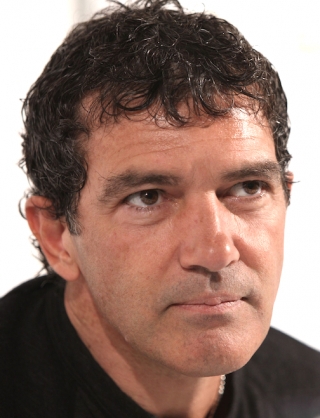
On this date in 1960, actor-director José Antonio Domínguez Banderas was born in Málaga, Spain, to José Domínguez Prieto, a police officer, and Ana Banderas Gallego, a teacher. He attended Catholic school as a child. After completing his studies at Malaga’s School of Dramatic Art, he joined the National Theater of Spain and caught the eye of director Pedro Almodóvar and had his 1982 film debut in “Labyrinth of Passion.”
He then made several more movies with Almodóvar, including his breakthrough role in 1990’s controversial “Tie Me Up! Tie Me Down!” as a mental patient who kidnaps a porn star played by Victoria Abril. In 1991 he was introduced to Hollywood in the pseudo-documentary “Madonna: Truth or Dare,” which led to his critically praised 1992 performance as a struggling musician in “The Mambo Kings.”
Hollywood kept Banderas incredibly busy in the 1990s. He appeared in six movies in 1995 alone. He married actress Melanie Griffith in 1996 after ending his nine-year union with Ana Leza. He and Griffith divorced in 2015 after having a daughter, Stella, in 1996. Banderas then began a relationship with Nicole Kimpel, a Dutch investment banker 20 years his junior. As of this writing in 2021, they live in Spain.
His debut as a director was in “Crazy in Alabama (1999), starring Griffith. He made his eighth film with Almodóvar in 2019, “Dolor y gloria” (Pain and Glory). It earned him the Cannes Film Festival Award for Best Actor along with Oscar and Golden Globe nominations. He was nominated for a 2003 Tony Award for Best Actor in a Musical for “Nine” and for Golden Globe Awards for “The Mask of Zorro” (1998) and “Evita” (1996).
Asked in 2019 about his relationship with the Catholic Church, he said: “I’m not a practicing Catholic, but I am culturally Catholic. I participate in some ceremonies of my hometown, but they are pretty popular. The Holy Week in Málaga, I participate in that. But that is different. This is a way to connect with the transcendental and the spiritual world without people in the middle.” (GQ magazine, Oct. 1, 2019)
In 2017 he had a heart attack which he later said was “one of the best things that ever happened in my life,” adding, “Now, there is only space for truth and nothing else. So you start searching for it: What is my truth? What am I? What is my role in life?” (USA Today. Oct. 1, 2019)
Banderas confirmed on his 60th birthday in 2020 that he had tested positive for COVID-19.
PHOTO: Banderas in 2009 at the Karlovy Vary International Film Festival in the Czech Republic; photo by Petr Novák, Wikipedia, under CC 3.0.
“I have to recognize that I am agnostic. I don’t believe in any kind of fundamentalism. I prefer to take life in a different way, with a sense of humor. I try to teach my kids to be open. Whatever they believe is fine with me.”
— Interview, People magazine (April 6, 2006)
Keanu Reeves
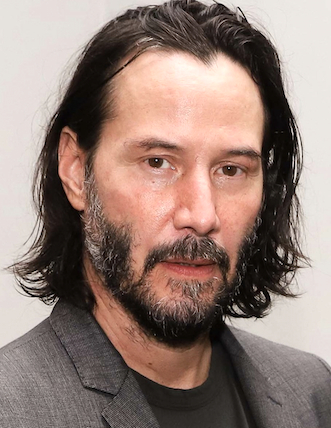
On this date in 1964, actor Keanu Charles Reeves was born in Beirut, Lebanon, to Patricia (née Taylor) and Samuel Reeves Jr. His father, a mixed-ancestry Hawaiian, abandoned the family when Reeves was 3. His English mother, a costume designer and performer, would marry three more times. Reeves grew up primarily in Toronto and became a naturalized Canadian citizen.
Keanu translates roughly from Hawaiian to “cool breeze over the mountains.” He attended four high schools, played hockey and worked as an actor while in school before dropping out at age 17. His feature film debut was in the 1986 hockey flick “Youngblood” with Patrick Swayze and Rob Lowe. “Bill & Ted’s Excellent Adventure” (1989) provided his breakthrough role, followed by “Parenthood.”
From then on it was all systems go, as he appeared in movie after movie for a decade. Of particular note in the 1990s were “Point Break,” “Bill & Ted’s Bogus Journey,” “My Own Private Idaho,” “Bram Stoker’s Dracula,” “Little Buddha,” “Speed,” “Johnny Mnemonic,” “The Devil’s Advocate” with Charlize Theron, “Feeling Minnesota” and in 1999 “The Matrix,” which with its sequels became a franchise of sorts.
Though Reeves would often face criticism for his deadpan delivery and perceived limited range, he played roles in a variety of genres, from art-house fare to action thrillers. In the rom-com “Something’s Gotta Give” (2003), he co-starred with Jack Nicholson and Diane Keaton. In 2005, when he got a star on the Hollywood Walk of Fame, he played the title role in the supernatural thriller “Constantine” about a detective who communicates with half-angels and half-demons.
Asked if he grew up “rooted in the Christian mythology” of “Constantine,” Reeves said, “I went to a Catholic boys school for a year, but that was to play hockey. Religion class was quite contentious for me.” (AP interview, Feb. 15, 2005) “I wasn’t raised in any special denominations and I haven’t taken on any so far,” Reeves replied to another reporter’s question whether his “Constantine” role had changed his views on religion. (News24 South Africa, Feb. 3, 2005)
After several years of stagnation, his career had a resurgence in 2014 with his leading role as a retired hitman seeking vengeance in “John Wick.” Sequels followed in 2017 and 2019, with at least two others in the works for 2022 and thereafter. “Bill & Ted Face the Music” was released in 2020 and a fourth Matrix film opened in December 2021.
Jennifer Syme, Reeves’ significant other, gave birth eight months into her pregnancy in 1999 to a stillborn daughter. They broke up several weeks later. Syme died in 2001 after her vehicle hit three parked cars in Los Angeles. Reeves met Alexandra Grant at a 2009 dinner party; they went on to collaborate on two books and went public with their relationship in 2019.
Reeves is not a Buddhist, despite persistent rumors that he is. A Daily Beast reporter asked him about it in 2017. “No, no. I had a little bit of experience with it when I was working on ‘Little Buddha,’ but I haven’t taken refuge in the dharma.”
In the Associated Press interview referred to earlier, he was asked “What are your notions of heaven and hell, eternal damnation vs. eternal bliss?” Reeves: “Well, I hope I get the bliss. And I know I’m going to have to work for it. But I’ve got to say, really, I have no kind of, can I say ‘secular religiosity.’ ”
The follow-up question: “What would be your concept of a personal hell for all eternity?” Reeves: “I guess living without love, without experiencing it or being able to give it. I think the aspect of that would be, that’s pretty strong punishment.”
PHOTO: Reeves in 2019 in São Paulo, Brazil; Governo do Estado de São Paulo photo under CC 2.0.
STEPHEN COLBERT: What do you think happens when we die?
REEVES: I know that the ones who love us will miss us.— "The Late Show with Stephen Colbert" (May 11, 2019)
Rosie Perez
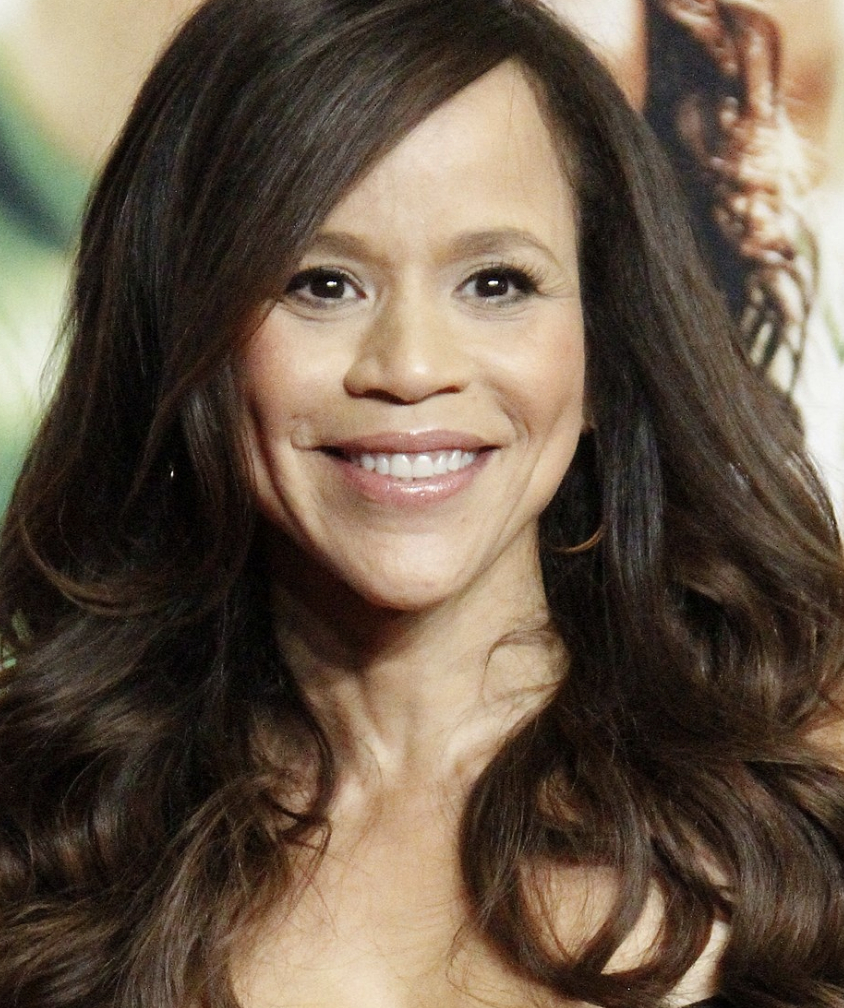
On this date in 1964, entertainer and activist Rosa María “Rosie” Perez was born in Brooklyn, N.Y., to Lydia Perez and Ismael Serrano. Her parents weren’t married to each other and a week after giving birth, her schizophrenic mother left her at the home of Rosie’s aunt and vanished, leaving her there for the next three years.
In her 2014 memoir Handbook for an Unpredictable Life: How I Survived Sister Renata and My Crazy Mother, and Still Came Out Smiling (With Great Hair), Perez detailed how her mother returned one day and soon turned her over to a Catholic orphanage, where she was physically and emotionally abused by nuns and became “the ‘property’ of the Catholic Church.” She was also sexually abused by her brother on a visit to her mother’s.
At age 19 she was hired as a dancer on the music and dance TV show “Soul Train” while she was attending college in Los Angeles. In 1988, director Spike Lee hired her for her first major acting role in “Do the Right Thing.” She starred in the hit comedy “White Men Can’t Jump” (1992) co-starring Wesley Snipes and Woody Harrelson.
Perez was nominated for the Best Supporting Actress Oscar for her role in the 1993 film “Fearless” and attended the ceremony with her father. She had roles in “Perdita Durango” (1997), “The 24 Hour Woman” (1999), “Riding in Cars With Boys” (2001), “Pineapple Express” (2008) and most recently as of this writing, in the 2020 superhero film “Birds of Prey.”
Perez has choreographed music videos by Janet Jackson, Bobby Brown, Diana Ross, LL Cool J and worked as choreographer on the TV series “In Living Color” (1990–94). She made her Broadway debut in 2003 in Terrence McNally’s “Frankie and Johnny in the Clair de Lune.” In 2015 she returned to Broadway to star in “Fish in the Dark,” written by Larry David. She played Lucille in “Clifford the Big Red Dog” (2021), an adaptation of the children’s book series by Norman Bridwell.
She co-hosted the ABC-TV talk show “The View” in 2014-15 but left after one season. Perez is an activist for Puerto Rican rights. She married filmmaker and playwright Seth Zvi Rosenfeld in 1991. They divorced in 2001. She married artist Eric Haze in 2013. She has no children.
PHOTO: Perez at the premiere of her film “Won’t Back Down” in 2012; Joella Marano photo under CC 2.0.
“The abuse that I endured at the hands of nuns made me the type of person where I don’t believe in anybody’s dogma. I don’t buy it. It’s just a form of control. I do believe in energy. That’s my religion. The energy of love is necessary for me.”
— Perez interview, The New York Times (Jan. 13, 2020)
Twiggy
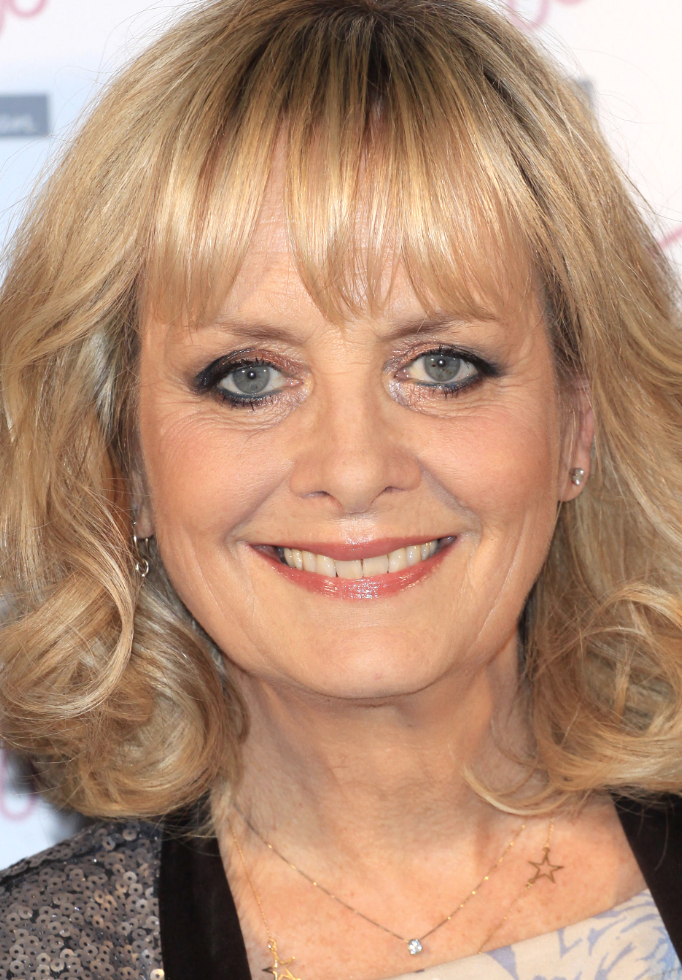
On this date in 1949, English model and actress Twiggy (née Lesley Hornby) was born in the London suburb of Neasden to working-class parents. She learned to sew at an early age, made some of her own clothes and started modeling while in secondary school.
At age 16 she was named “The Face of 1966” by the tabloid Daily Express and landed on the cover of Vogue. Her signature, rail-thin “mod” look led to her nickname and international fame as a cultural icon. She announced her retirement from modeling in 1970, stating, “You can’t be a clothes hanger for your entire life.” She then enjoyed a successful career as a screen, stage and television actress and recording artist.
Her 1971 role in “The Boy Friend” brought her two Golden Globes. Her first appearance in the theater was in “Cinderella” in London’s West End in 1974. In 1983 she starred on Broadway in the award-winning Gershwin musical “My One and Only,” for which she was nominated for a Best Actress Tony Award. Her last stage appearance was in 2003 in the title role in the George Bernard Shaw play “Mrs. Warren’s Profession.”
Twiggy released her ninth album, “Romantically Yours,” in 2011. It featured the standards “Bewitched, Bothered and Bewildered,” “Blue Moon,” “My Funny Valentine,” “Someone to Watch Over Me” and “They Can’t Take That Away from Me,” along with a vocal by her daughter Carly Lawson on Neil Young’s “Only Love Can Break Your Heart.”
Twiggy married American actor Michael Witney, nearly 20 years her senior, in 1977. Their daughter Carly was born in 1978. He died in 1983 at age 51 from a heart attack. She married Leigh Lawson in 1988 after his 10-year relationship with actress Hayley Mills ended. They met while working on the film “Madame Sousatzka” (directed by John Schlesinger with Shirley MacLaine in the title role). Lawson adopted Carly, who took his surname.
In 2019 she was named a Dame of the British Empire under her married name Lesley Lawson for services to fashion, the arts and to charity.
PHOTO: Twiggy in 2012 in London; photo via Shutterstock by Featureflash Photo Agency.
“Organised religion is not for me. Most wars over the centuries have been about religion. I think fate plays a big role in our lives and that if we were nicer to one another the world would be a better place.”
— Twiggy interview, The Guardian (Sept. 15, 2012)
Malachy McCourt
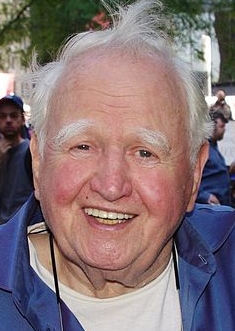
On this date in 1931, actor-writer Malachy Gerard McCourt was born in Brooklyn, N.Y., one of seven children born to Irish immigrants Malachy and Angela (Sheehan) McCourt. The family moved back to Ireland during the Great Depression, with the children growing up in poverty due to their father’s frequent absence and alcoholism — a disease his namesake would later fall prey but not succumb to — and their mother’s subsequent depressed state. At age 20, McCourt returned to New York.
After an Air Force hitch, he worked as a laborer, dishwasher, longshoreman and concrete inspector for the New Jersey Turnpike. He started the first singles bar in Manhattan, then began a tumultuous radio talk show career in 1970, which ended six years later with his firing. He had some success as a stage and TV actor and eventually made several movies. After divorcing his first wife Linda Wachsman after they had two children, he married Diana Galin in 1963. They had two more children together. He took his last drink of alcohol in 1985.
While his brother Frank was the more acclaimed writer (particularly for his Pulitzer Prize-winning Angela’s Ashes), McCourt also wrote extensively, including his own best-selling memoir A Monk Swimming (from his mishearing as a child the Hail Mary’s “Blessed art thou amongst women”).
He also wrote about being molested by two priests, and in Death Need Not Be Fatal took the Catholic Church to task for failing him personally and the poor and impoverished generally. He was the 2006 Green Party candidate for New York governor, losing to the Democratic candidate Eliot Spitzer.
He died at age 92 at Lenox Hill Hospital in New York City. (D. 2024)
PHOTO: By David Shankbone under Creative Commons Attribution 3.0
“I started out life as a member of the One Holy Roman Catholic Apostolic Church, and I am coming to the end of it without organized religion or mystical thinking. I am an atheist, thank God, with no fear of hell and no hope of heaven.”
— "Death Need Not Be Fatal" (Center Street, May 16, 2017)
Donald Glover
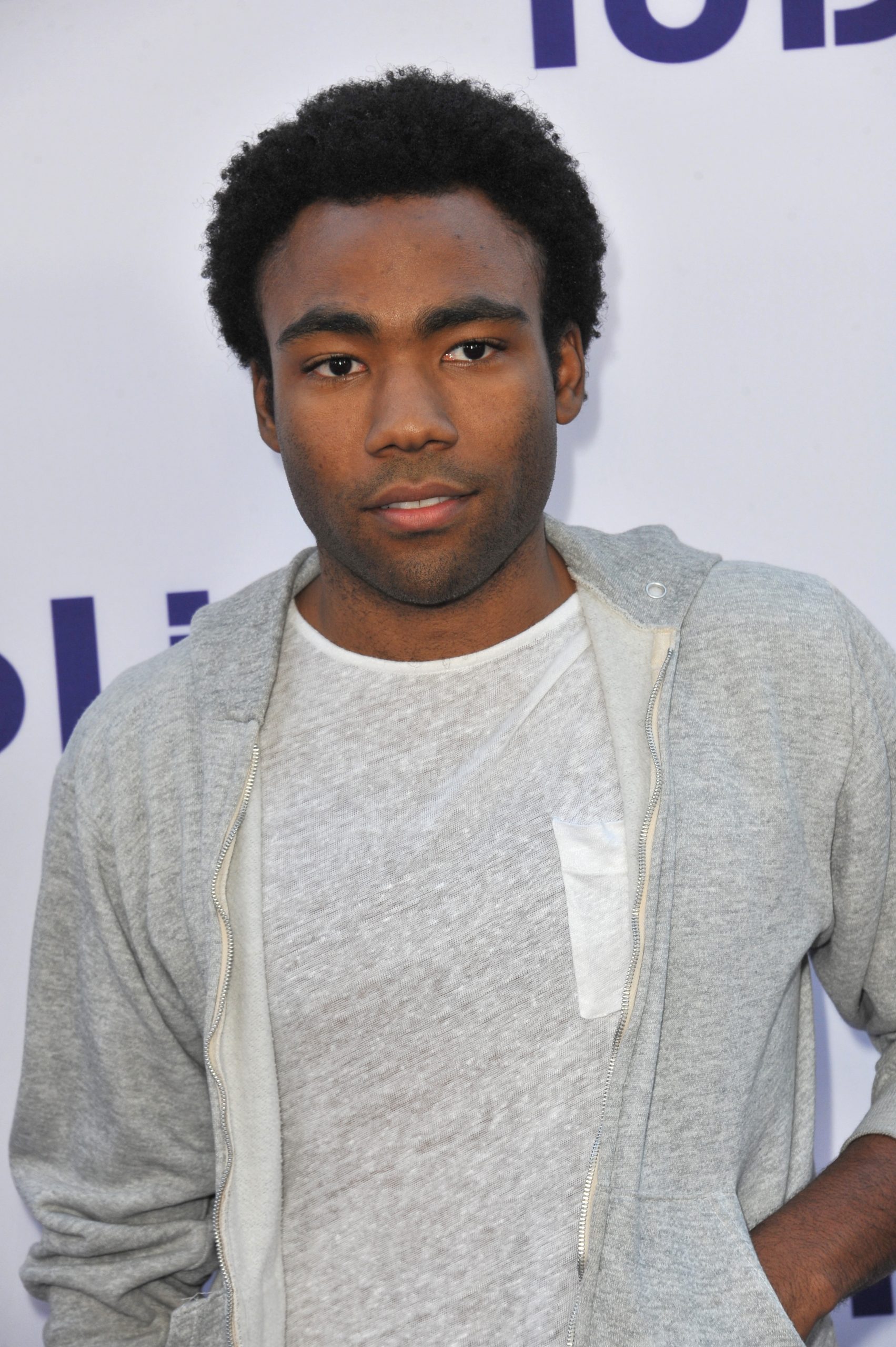
On this date in 1983, writer, actor, rapper and comedian Donald McKinley Glover was born at Edwards Air Force Base in California. His mother, Beverly, was a babysitter. His father was a postal worker. He had two siblings and several foster siblings, who grew up together in Stone Mountain, Ga. Glover graduated from New York University with a degree in dramatic writing in 2006. Immediately after graduating, he began writing for the NBC comedy “30 Rock,” for which he received a Writer’s Guild nomination in 2009. However, Glover is best known for playing Troy, the “jock” in a community college study group on the comedy series “Community.”
In addition to writing and acting, Glover performs stand-up comedy and recorded a special for Comedy Central in 2010. He also raps and has released several albums and EPs under the stage name Childish Gambino. His 2014 album “Because the Internet” was nominated for a Grammy for Best Rap Album. He was also nominated for best rap performance for the single “3005.”
Although he was raised a Jehovah’s Witness, Glover has distanced himself from his faith. In the song “Won’t Stop,” Glover refers to himself as an “airport atheist.”
“I think everybody kind of hits that point where they say, ‘Okay, am I doing this out of tradition? Do I actually believe this?’ ”
— Interview, Zap2it (Feb. 3, 2011)
Chris O’Dowd
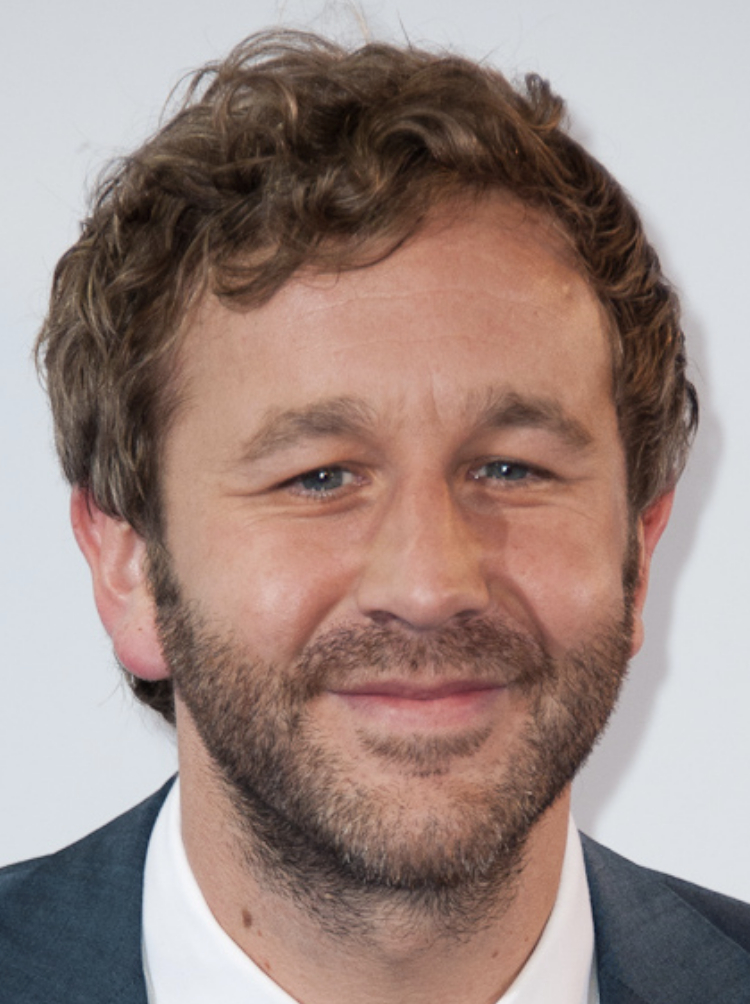
On this date in 1979, actor Chris O’Dowd was born in Sligo, Ireland, the youngest of five children. His mother was a psychotherapist and his father was a graphic designer. Feeling that his only career options at home were to join his father’s business or work in the fish market, O’Dowd left to attend University College-Dublin, where he studied politics and sociology. It was at UCD that he became interested in acting. Eventually he left UCD without finishing his degree to study at the London Academy of Music and Dramatic Arts.
His first on-screen acting appearance was in 2003 when he was cast in the BBC television series “Red Cap.” His big break came in 2006 when he landed a starring role in the popular comedy “The IT Crowd” (2006-13). He has since appeared in a number of films, including the box office hit Bridesmaids (2011) Friends with Kids (2011) and The Sapphires (2012). He is also a writer and actor for the original series “Moone Boy,” which he created.
O’Dowd has been very open about the fact that he’s not religious. In an interview with GQ magazine, he referred to religion as a “weird cult” and suggested that President Obama had to overstate his Christianity in order to be elected.
PHOTO: O’Dowd at the 2013 British comedy awards. Photo by Christopher William Adach under CC 2.0.
“For most of my life, I’ve been, ‘Hey, I’m not into it, but I respect your right to believe whatever you want’. But as time goes on, weirdly, I’m growing less liberal. I’m more like, ‘No, religion is ruining the world, you need to stop!’ ”
— Chris O’Dowd interview, GQ (March 8, 2014)
Michael McKean
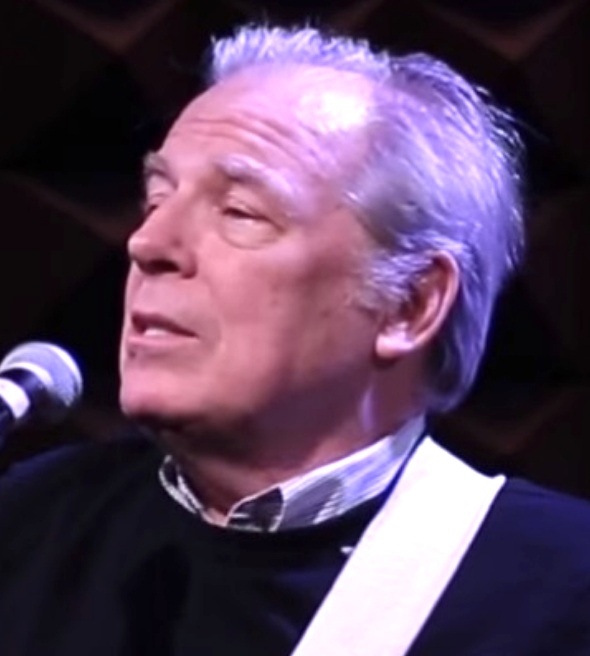
On this date in 1947, entertainer Michael John McKean was born in New York City to Ruth and Gilbert McKean. His mother worked in a school library and his father was a recording executive for RCA and Columbia before co-founding Decca Records.
McKean grew up in Sea Cliff on Long Island. After high school graduation he was briefly a member of The Left Banke, a band which earlier had hits with “Walk Away Renée” and “Pretty Ballerina.” McKean’s acting breakthrough came in 1976 when he and David Lander, who met as Carnegie Mellon University theater students, joined the cast of the ABC sitcom “Laverne & Shirley,” respectively playing Lenny and Squiggy.
After leaving the show in 1982, McKean played David St. Hubbins in the 1984 mockumentary film “This Is Spinal Tap” and appeared in the soap opera spoof “Young Doctors in Love.” He had more film roles, including in “Planes, Trains and Automobiles (1987), “Short Circuit 2” (1988) and with Kiefer Sutherland and Dennis Hopper in the adventure comedy “Flashback” in 1990.
McKean joined the “Saturday Night Live” cast from 1994-95 after guest hosting. At 46, he was the oldest person ever to join the cast at the time. McKean reunited in 2000 with Spinal Tap’s Christopher Guest in “Best in Show” and “A Mighty Wind” (2003), for which he co-wrote several songs, including “A Mighty Wind,” which won a Best Song Grammy, and the Oscar-nominated “A Kiss at the End of the Rainbow.”
He continued to land numerous film and TV roles and performed on Broadway in 2012 in a new production of the 1960 play “The Best Man” by Gore Vidal. He was nominated for a 2019 Primetime Emmy for his portrayal of Chuck McGill, brother of Saul Goodman, on the AMC drama “Better Call Saul.” His most recent film role as of this writing was in “Pink Skies Ahead,” scheduled for a 2020 release.
McKean married Susan Russell in 1970. They had two sons, Fletcher and Colin, before divorcing in 1993. Colin, a movie production assistant, died at age 36 of a suspected heroin overdose in 2012. McKean married actress and singer-songwriter Annette O’Toole in 1999.
He criticized U.S. Secretary of State Mike Pompeo in 2020 after a 2015 video surfaced in which Pompeo expressed his opposition to same-sex marriage while addressing a church congregation. In the video, Pompeo says, “We will continue to fight these battles. It is a never-ending struggle, until the Rapture.” McKean tweeted, “You wouldn’t accept an air-traffic controller who was a flat-earther, so why accept a US Secretary of State who thinks the Rapture is imminent?” (Jan. 10, 2020)
PHOTO: McKean singing “Kiss at the End of the Rainbow” with Annette O’Toole at Joe’s Pub at the Public Theater in New York City in 2016; “Employee of the Month” photo under CC 3.0.
“Belief in the Rapture should disqualify anyone from holding public office.”
— McKean post on Twitter (April 8, 2020)
Ed Asner
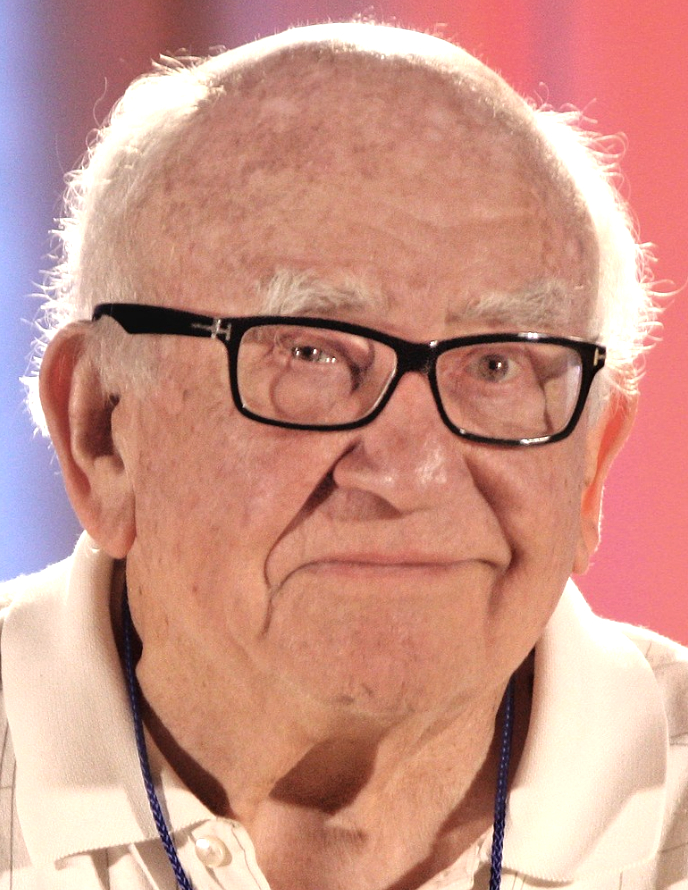
On this date in 1929, actor Edward (né Etye) Asner was born in Kansas City, Mo., to Lizzie (née Seliger), a housewife, and Morris Asner, who ran a junkyard and secondhand shop. His Orthodox Jewish parents were born in Russia.
Asner didn’t like Judaism as a child, feeling it alienated him from his peers in public school when he wanted to be “the regular Joe that everybody else was. I resented it and wanted to put it behind me as fast as I could.” (Fox News interview, Nov. 15, 2012)
After attending the University of Chicago from 1947-49, he worked on the assembly line for General Motors and served with the U.S. Army Signal Corps in Europe. He helped found the Playwrights Theatre Co. in Chicago before moving to New York City. His first Broadway role in “Face of a Hero” alongside Jack Lemmon was in 1960 and he started to make inroads as a television actor. His film debut in 1962 was in the Elvis Presley vehicle “Kid Galahad.”
Asner was best known for his character Lou Grant, a crusty news editor on “The Mary Tyler Moore Show” in 1970 and later spun off on the “Lou Grant,” “Rhoda” and “Phyllis” series. He had nearly 400 acting credits and is the most honored male performer in the history of the Primetime Emmy Awards, having won eight, including five for portraying Grant and two for TV mini-series: “Rich Man, Poor Man” (1976) and “Roots” (1977). He served two terms as Screen Actors Guild president from 1981-85.
In the 2007 touring stage production “The Great Tennessee Monkey Trial,” Asner played William Jennings Bryan opposite John de Lancie as Clarence Darrow. De Lancie, best known as “Q” on the TV series “Star Trek: The Next Generation,” was the first recipient of FFRF’s Clarence Darrow Award.
At age 82 in 2012, Asner returned to Broadway after a 23-year absence, joining the cast of “Grace,” a play starring Paul Rudd as a religious idealist trying to open a chain of Gospel motels in Florida. Asner played a gruff exterminator. In 2013 during his one-man show “FDR” in Indiana, he was rushed to the hospital and diagnosed with exhaustion.
In 2018 he started playing the title character in a touring stage production of the political comedy “God Help Us!” in which he used his “divine” judgment to moderate a heated exchange of ideas between characters Randi and Larry. It could be presented either with a veteran cast or with local actors playing Larry and Randi. Asner played God. When the show played in December 2019 in Madison, Wis., Asner visited FFRF’s headquarters to be a guest on its TV show “Freethought Matters.”
Asner was married to Nancy Sykes from 1959-88 and they had three children: Kate and twins Matthew and Liza. In 1987 he had a son, Charles, with Carol Jean Vogelman. He married producer Cindy Gilmore in 1998 after a seven-year engagement. They divorced in 2015.
Asner was a parent and grandparent of children with autism and was actively involved with the nonprofit group Autism Speaks. He published “The Grouchy Historian: An Old-Time Lefty Defends Our Constitution Against Right-Wing Hypocrites and Nutjobs” in 2017. In 2018 he announced the creation of the Ed Asner Family Center to support differently abled people.
His death at age 91 was announced on his official Twitter account: “We are sorry to say that our beloved patriarch passed away this morning peacefully. Words cannot express the sadness we feel. With a kiss on your head — Goodnight dad. We love you.” (D. 2021)
PHOTO: Asner at age 82 at the 2012 Phoenix Comicon; Gage Skidmore photo under CC 3.0.
“I don’t know if there is a God, I’m agnostic — the cheap and easy way.”
— Asner, Fox News interview (Nov. 15, 2012)
Shriram Lagoo
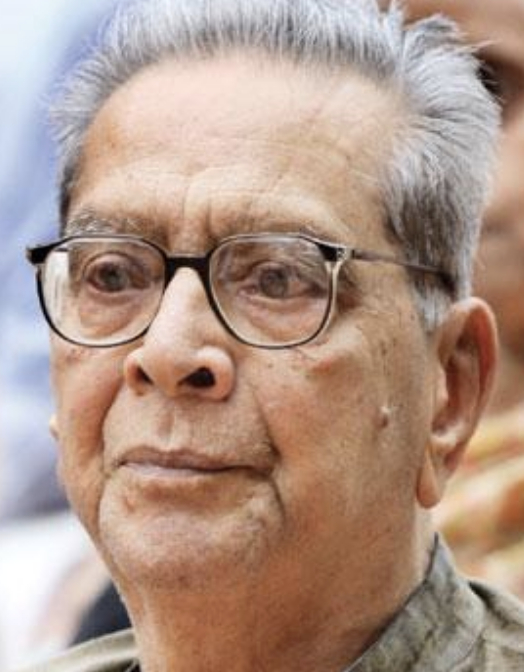
On this date in 1927, Dr. Shriram Lagoo, acting luminary and rationalist, was born in Satara district, India. He was one of the giants of modern Indian theater and appeared in over 250 movies, including “Gandhi.”
Lagoo was a medical doctor by training (an ENT specialist) and practiced for a number of years in India and Tanzania before the lure of acting proved to be irresistible. After proving his mettle in Marathi-language theater, he transitioned to cinema, regaling filmgoers for decades with character roles in mainstream and offbeat films (including Gandhi’s mentor Gopal Krishna Gokhale in the Oscar-winning biopic).
He received several awards for his contribution to cinema and stage, such as the Padma Shri, a top Indian government honor, and the Filmfare Award for Best Supporting Actor for his role in the film “Gharaonda” (The Nest). His 2011 autobiography was humbly titled Lamaan (Carrier of Goods).
Lagoo was an outspoken rationalist and was closely associated with the Maharashtra Andhashraddha Nirmoolan Samiti (a group that FFRF honored in 2019 with the Avijit Roy Courage Award). Fellow acting legend and freethinker Amol Palekar said of his friend, “He was an avowed atheist and despite enduring unending criticism, he had the guts to declare ‘Let God be retired’ on a public platform. … He suffered censure, but he stood firmly by his principles and views.”
Lagoo’s wife, Deepa Lagoo, is also a renowned actress. They had two sons and a daughter. On the untimely death of his son Tanveer, Lagoo instituted in his honor the Tanveer Samman, annually given to an outstanding theater personality. Lagoo was accorded a state funeral when he died at age 92. (D. 2019)
“I do not believe in God and I feel it is now time to retire God. Concept of God is a very beautiful product of poet’s imagination and was essential during the initial stages of civilization but the time has come when one should face the world with a completely rational attitude.”
— Lagoo public lecture (undated)
Amol Palekar
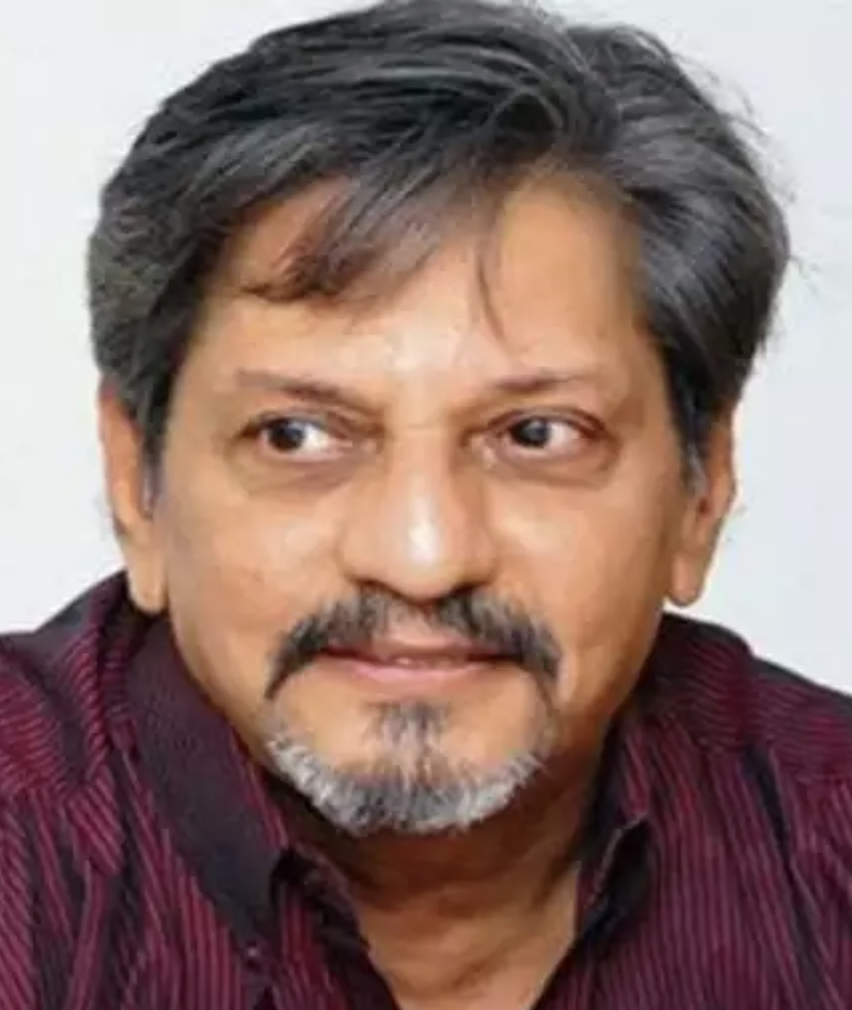
On this date in 1944, Amol Palekar, one of the most beloved leading men in Indian cinema, was born in Mumbai. An acclaimed actor, director and painter, Palekar carved a niche for himself as an “everyman” grappling with life and love on the big screen.
Palekar graduated from the Sir J.J. School of Arts, Mumbai, and initially chose painting as a profession. He soon transitioned to Marathi and Hindi-language theater and then to movies. It was in 1970s cinema that he made his mark. He presented an alternative to the typical Bollywood heroes of the time and left such an impact with his endearing presence that Indian film lovers remember him fondly to this day.
In a range of comedies and dramas, Palekar offered viewers a reflection of their own lives. He also performed in a number of regional language movies. Palekar decided to largely quit acting in the mid-1980s and went on to direct many critically acclaimed films and TV serials in Marathi and Hindi that often spotlighted gender issues.
His performances and the movies he’s made have won several honors over the years. Palekar has described himself as both atheist and agnostic. He was good friends with Narendra Dabholkar, the assassinated founder of the Maharashtra Andhashraddha Nirmoolan Samiti (a group that FFRF honored in 2019 with the Avijit Roy Courage Award), and with fellow freethinking actor Shriram Lagoo.
He co-signed a petition in 2019 with hundreds of other prominent artistes appealing to Indians to “help safeguard the Constitution and our syncretic, secular ethos” by voting the Hindu Nationalist government of Narendra Modi out of power.
“I am an atheist also. But I think to begin with, I am an agnostic.”
— Interview, the Times of India (Dec. 23, 2015)
Kirk Douglas
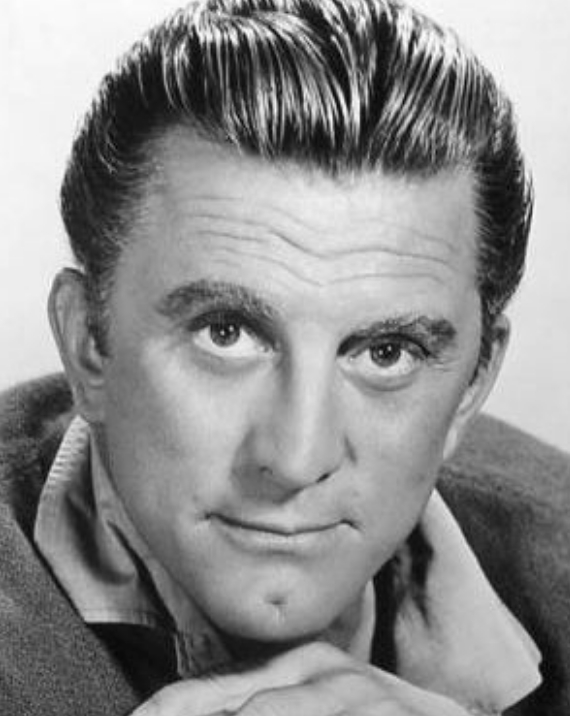
On this date in 1916, actor Kirk Douglas (né Issur Danielovitch Demsky) was born in Amsterdam, N.Y., the youngest child and only son in a family of seven children. His parents were Russian-Jewish immigrants who were both illiterate. He told People magazine (Oct. 3, 1988) that he grew up in a community afflicted with “a tremendous hatred of Jews” and that he was regularly attacked by Christian students. When he came home bloody, his mother told him, “As a Jew, you will have to be twice as good to get ahead in life.”
When he was 12, the Sons of Israel congregation offered to send him to a yeshiva to become a rabbi but he declined, already knowing he wanted to become an actor. He entered St. Lawrence University in Canton, N.Y. on a wrestling scholarship and after graduating in 1938 studied at the American Academy of Dramatic Arts. He made his Broadway debut as a singing Western Union boy in “Spring Again” (1941). He changed his name to Kirk Douglas, enlisted in the Navy and served as a communications officer with an anti-submarine unit.
His film debut was in 1946 in “The Strange Love of Martha Ivers,” playing Barbara Stanwyck’s alcoholic husband. He would appear in over 90 films during his career. The first of his three Best Actor Oscar nominations was for “Champion” (1949), followed by “The Bad and the Beautiful” (1952) and “Lust for Life” (playing Vincent Van Gogh, 1956). He received an Honorary Oscar in 1996 for 50 years as a creative and moral force in the motion picture community. Many saw his role as a Thracian slave in “Spartacus” (1960) as career defining.
He also was the film’s executive producer. Douglas later said it was perhaps his proudest professional accomplishment to have hired the blacklisted Dalton Trumbo to write the script. Between 1970 and 2008 he made nearly 40 movies with some of Hollywood’s biggest stars and appeared on numerous TV shows. He also wrote 11 books, including The Ragman’s Son (1988), the first of several autobiographies. In that he wrote “Judaism and I parted ways a long time ago, when I was a poor kid growing up” and that over the years “I tried to forget that I was a Jew.”
That same year (Oct. 3, 1988) he told People magazine: “When a dog dies, does he go to heaven? Why should we think we’re so special that we cannot just die? No, you only go around once and just hope you get the brass ring. The rest is ego.”
But after a 1991 helicopter crash in which he was severely injured and two others died, he started to reassess his Jewishness, writing about it in Climbing the Mountain: My Search for Meaning (1997). Part of the attraction besides spirituality was theatricality: “The Torah is the greatest screenplay ever written. It has passion, incest, murder, adultery — really everything.” (Jewish Journal, Sept. 18, 1997)
He married actress Diana Dill, a native of Bermuda, in 1943. They had two sons, actor Michael Douglas (b. 1944) and producer Joel Douglas (b. 1947), before divorcing in 1951. In 1954 he married movie producer Anne Buydens, a German native. They had two sons, Peter (b. 1955), and Eric (b. 1958), an actor who died in 2004 from an overdose of alcohol and drugs. Anne converted to Judaism before they renewed their wedding vows in 2004 and Douglas had a second bar mitzvah at age 83.
A severe stroke in 1996 affected his ability to speak, which gradually but not totally returned. His penultimate film role was in “It Runs in the Family” (2003), which also starred his son Michael, Michael’s son Cameron and Kirk’s first wife Diana. In 2016 he celebrated his 100th birthday at the Beverly Hills Hotel. He died at home in Beverly Hills at age 103. (D. 2020)
PHOTO: Douglas in 1963 at age 47; public domain photo.
“In general I am against religion because they do so much harm. There are things even in the Jewish religion that I hate and things that I like. But I’m proud to be a Jew.”
— Douglas interview, The Jewish Chronicle (Sept. 20, 2012)
